#Silver Cicada Designs
Explore tagged Tumblr posts
Text
evil eye cutouts for the new year
I don't know ow about yall, but I need a good year. I'm finding myself really being drawn to imagery associated with protection and good luck.

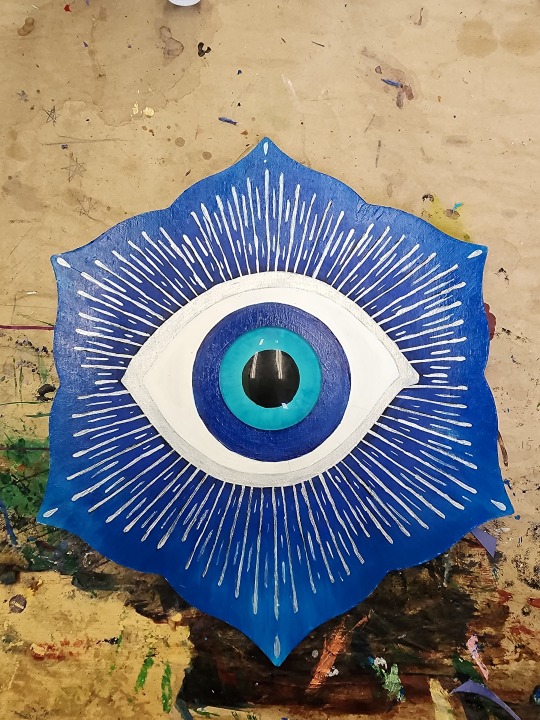
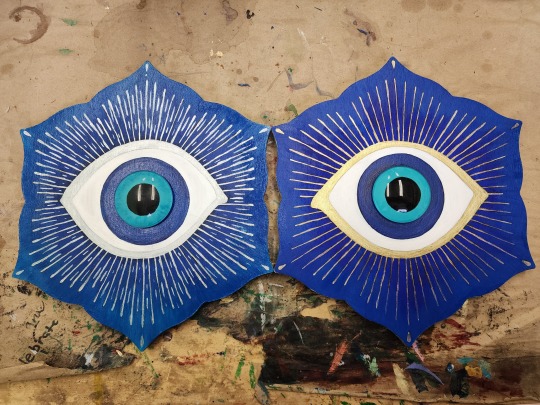
3 notes
·
View notes
Text
Royal Arrangements, Chapter 5
Telemachus x Reader
“She’s not here for romance. He’s not ready for a crown. But fate has other plans.” When your mother announces your engagement to Telemachus—yes, that Telemachus, son of Odysseus—you expect politics, not apologies. But the prince turns out to be more awkward than arrogant, more kind than kingly. And you? Well, you're not exactly the swooning type.
an-GUESS WHO ISN'T UP AT 11 PM WRITING AND POSTED AT 5 PM? I think I did something wrong lol but whatever.

The forest had quieted. Even the cicadas had tucked in their wings, and only the wind rustled, tugging at the branches like a child seeking attention. You stood a few paces ahead of Telemachus, half-hidden by the curling edge of a tree. In your hand, the dagger you always carried caught stray threads of moonlight.
You weren’t brandishing it. Just holding it—flat in your palm, your thumb brushing the worn engraving on its hilt. A pattern of swirls and waves, a commonly known design in Astreon.
“Do you always talk to your blade,” came his voice, steady and near enough that you knew he’d been watching you longer than he meant to admit, “or is it just when I’m around?”
You didn’t flinch. “Would you rather I talked to you?”
“I’d rather you didn’t look so ready to stab something.”
You glanced down, surprised to see your knuckles white around the grip. You let go. The dagger slipped back into your belt.
“There was a song,” you said. “Once. About a girl who left her city with only a blade and her name. The name didn’t save her.”
His brow furrowed. “Did the blade?”
You smiled wryly. “Depends who you ask.”
He stepped closer then, his footfalls soft in the loam. “What happened to her?”
“She wandered,” you murmured, not looking at him. “They made her walk from silver gates. With oaths beneath her skin. Her crown was light, her voice was glass, her fate was paper-thin…”
Your voice trailed off before the next stanza. You hadn’t meant to say it aloud.
Telemachus was watching you too carefully now—not with pity, or judgment. Just… understanding. The way someone might study a star they’d only ever heard stories about.
“Is that one of your songs?” he asked gently.
“It’s one of my ghosts.”
He nodded, like that made perfect sense. “You don’t seem like paper.”
“No,” you said quietly, pulling at a strand of hair. “But glass can cut.”
The woods held stillness like a held breath. Telemachus walked just ahead now, brushing aside the lower branches so they wouldn’t catch you. He didn’t say much. Neither did you. But the silence felt… settled. Like something earned.
Then he glanced back over his shoulder. “My mother used to say the best kind of silence is the kind you can share.”
You blinked. “What, like… this?”
A small smile played on his lips. “Yeah. I think so.”
You huffed a quiet laugh. “Didn’t take you for the sentimental type.”
“I’m not,” he said simply. “But some things make me wish I were.”
You stopped for half a second, heart catching. Just enough to feel something drop in your chest like a stone in water.
You tried to recover, teasing: “Like what? Me?”
But he didn’t laugh. Didn’t deflect. He just looked at you, soft and sure, and said “Yes.”
There it was. That fluttering drop in your stomach, like stepping too fast down the stairs.
You looked away, suddenly very interested in the path beneath your feet. “You’re getting good at this.”
“At what?”
“Making me lose my footing.”

Later, you found yourselves seated on a fallen log, the dagger resting across your knees now. Its shine was muted in the moss-dappled light. Telemachus stood a little ways off, arms crossed, watching as a breeze shook loose a few golden leaves overhead.
“I’ve never heard a song like that,” he said at last, voice low and reverent. “Not in Ithaca.”
“We don’t sing it much anymore, in Astreon I mean” you replied. “It’s more of a warning. The kind of tale we pass down to daughters, so they learn how to disappear instead of stand and fight.”
He was quiet for a long moment. Then, “You didn’t disappear.”
You looked up. He was watching you now, not blinking.
“You came here. You stood before my council. You carry a dagger like it’s part of your skin.” His gaze didn’t falter. “Whatever that song meant to teach you—you rewrote it.”
You didn’t know what you expected him to say—but it wasn’t that. And goodness, something fluttered low in your stomach.
“You’re not easy to understand,” he added, quieter now. “But you’re worth trying to.”
You turned away quickly, biting back the first response that tried to rise—because if you opened your mouth now, you weren’t sure what would come out.
The trees swayed. Somewhere above, a bird called once, sharp and sudden.
You peeked back at him. “Is that supposed to be flattery?”
A faint smirk tugged at his lips. “Would it work if it was?”
You threw a pinecone at him, aiming for his face but missing towards his chest. Causing you to laugh at your aim.
He caught the pinecone easily, like he’d half-expected it. Tossed it once in the air before letting it drop to the leaves at his feet.
“Is that how Astreons say thank you?” he asked.
You tilted your head, pretending to think. “No. That’s how we say don’t look at me like that.”
He raised a brow, amused. “Like what?”
You didn’t answer. Instead, you stood and brushed the moss from your chiton. The dagger stayed at your hip this time, forgotten for the moment.
“You said earlier,” you began, slowly, “that your mother liked silence.”
He nodded. “Said it was proof of peace.”
You stepped closer, sandals quiet in the thick underbrush. “And you? Do you believe that?”
His expression faltered—just a flicker, but you caught it. “I think…” He hesitated. “I think sometimes silence is the space between things. Between battles. Between people, maybe.”
“And us?”
Now it was his turn to look away. “We’re not at war, if that’s what you’re asking.”
“No.” You offered a faint smile. “Not yet.”
The words could’ve carried weight. Could’ve stung. But he only smiled back, a quiet, thoughtful thing. “Then maybe we’re somewhere between peace and the first volley.”
A pause. Your eyes met again.
You took a breath. “I don’t think I mind.”
Neither did he.
And the silence that followed didn’t feel empty.
It felt like something waiting to bloom.

tag list-@gothamsmom @barrythestrawberry041 @ricitos-de-carbon @graysw1fe @dorkyfangirl24 @woncloudie @cassielovw @nepttunesoop @lucathy4life @luckywitchsong @epichalfblood @ayaka-sakura @dxrlingluv
#epic the musical#writing#telemachus#greek mythology#telemachus epic the musical#epic#epic x reader#telemachus x reader#epic the musical x reader#telemachus epic
60 notes
·
View notes
Text
April 14, Xi'an, China, Shaanxi History Museum, Qin and Han Dynasties Branch (Part 2 - Daily Life, Societal Structure, and Culture):
This is one of the undisputed stars of the museum, the “Strange Golden Creature” (no joke, that's literally what's on the plaque), unearthed in Shaanxi Province in 1957. The reason for this name is probably because archaeologists haven't figured out what mythical creature this is supposed to be. It does seem to be from the ancient Xiongnu culture and appears to be a "chimera" of sorts, in the sense that it combines the general body of a deer, multiple birds (17 total; most are part of the antlers), and the branches of a tree. This artifact is one of my favorites, and showcases the advanced gold-working techniques of the ancient Xiongnu people. I can already imagine this mythical creature in a painting (although I suck at painting lol).

A yubi/玉璧, or jade disk, decorated with gu pattern/谷纹 (谷 means "grains"), this is because these patterns resemble sprouting rice kernels.
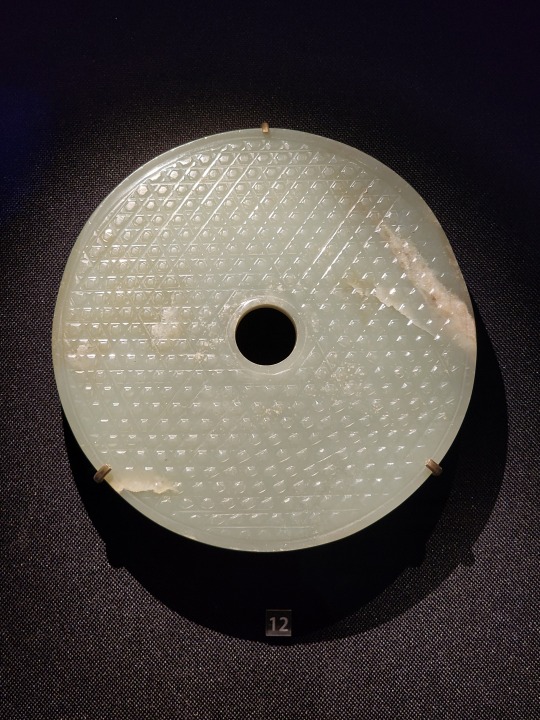
Han dynasty (202 BC - 220 AD) era jade cicada amulets (玉蝉). Cicadas symbolize "rebirth" into a new form (specifically becoming a xian/仙 immortal) in Chinese mythology, since they burrow beneath the ground as nymphs and re-emerge before moulting into their adult forms. There's a sentence in the biography of Qu Yuan/屈原 (the guy whose death was said to be the reason why Duanwu Festival/端午节 and zongzi/粽子 exist) from Records of the Grand Historian/《史记》 that gives an idea on what cicadas represent:
"Standing in muck yet can cleanse himself (referring to Qu Yuan) of it, like a cicada emerging from muddy filth, able to fly above and remain unsullied by worldly dust, persisting in its innocence despite it all." (濯淖汙泥之中,蟬蛻於濁穢,以浮游塵埃之外,不獲世之滋垢,皭然泥而不滓者也。)
There are two types of cicada amulets, the ones with holes are meant to be worn as jewelry, and ones without holes are meant to be placed in the mouth of the deceased before burial, so that the deceased can become a xian immortal after death.
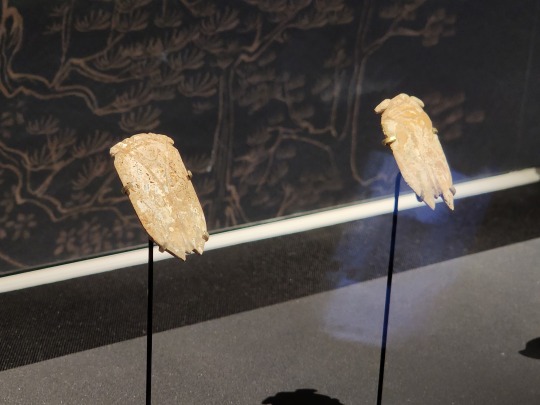
Left: jade decor piece, not sure what it was a part of. Right: the decorated jade pommel of a sword.
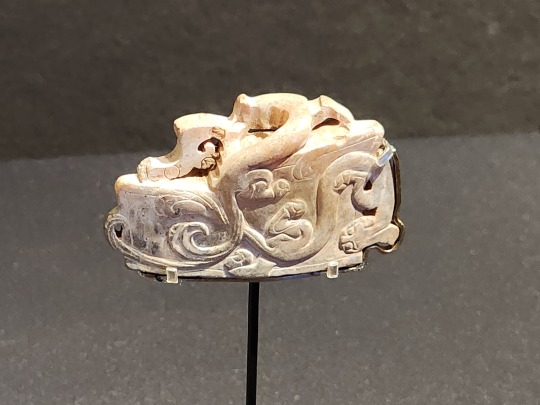
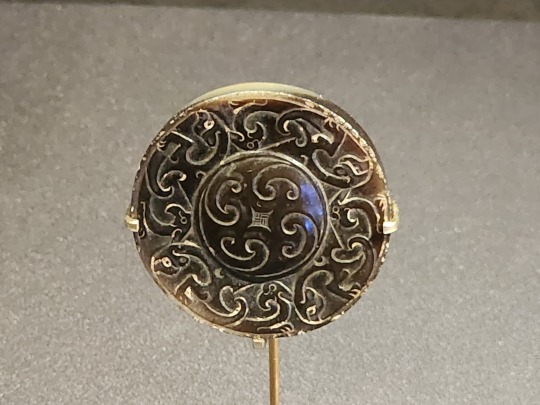
A Han-era painted clay statue of a sitting woman. As mentioned in an earlier post, this sitting position is called jizuo/跽坐. Sitting like this on cushions or on specialized T-shaped stools called zhizhong/支踵 (designed in such a way that one is basically sitting on the stool and not on one's legs) was the proper formal sitting posture, until chairs were popularized post-Tang dynasty (618 - 907 AD). Before then people used beds as chairs.
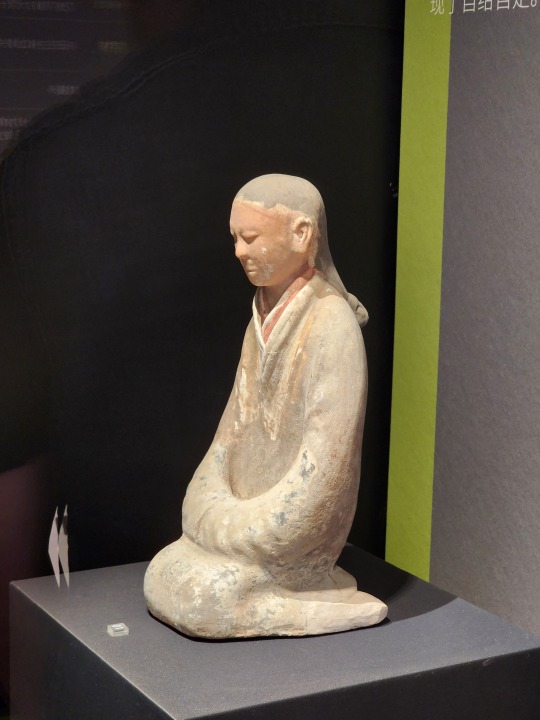
Han-era painted pottery figurines of entertainers
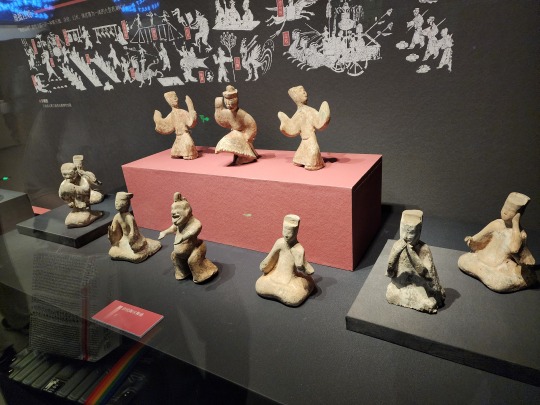
An arrangement of pottery models and figurines that shows life in the courtyard of a residence in Han dynasty:
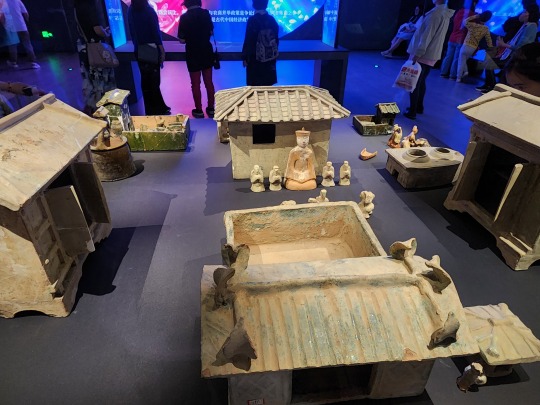
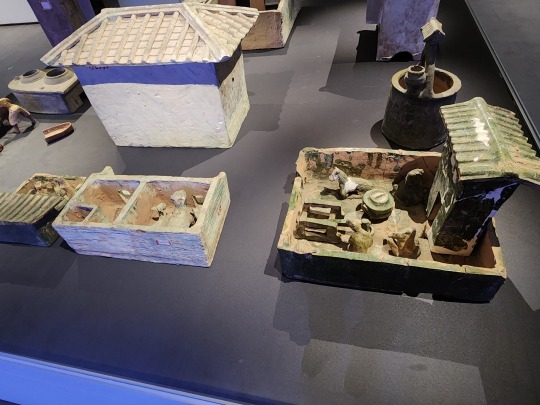
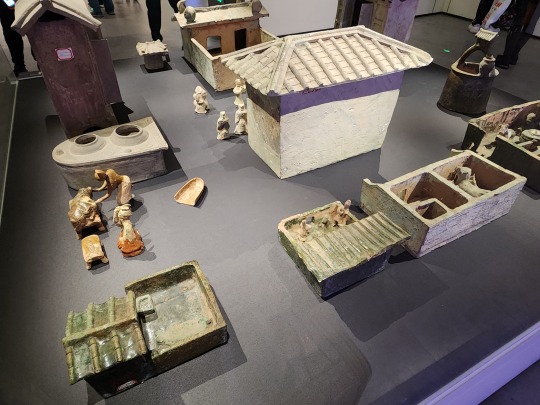
Pottery figurine of a chef/butcher (this type of figurines is called paochuyong/庖厨俑). I think that thing on the table is a......fish?
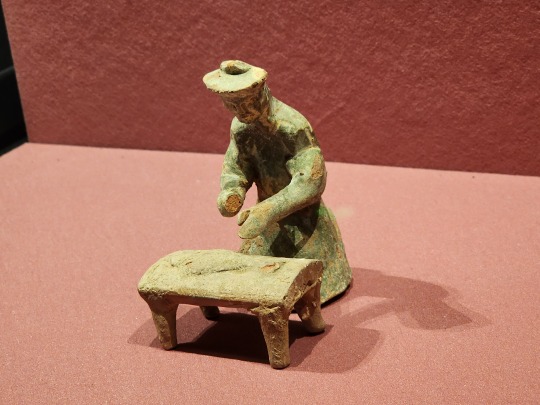
Left: pottery model of a stove. Right: pottery model of a mill
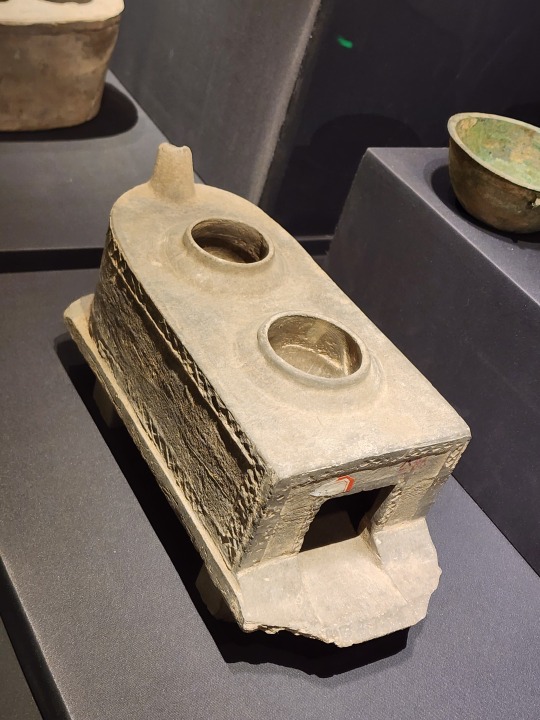
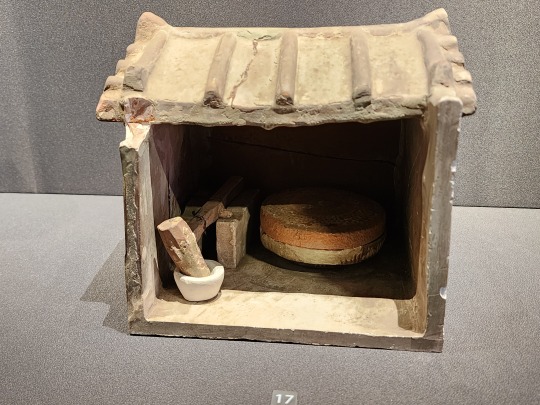
Painted pottery models of areas on farms and painted pottery figurines of domestic animals. Don't know what those long-necked animals in the pen are supposed to be though......
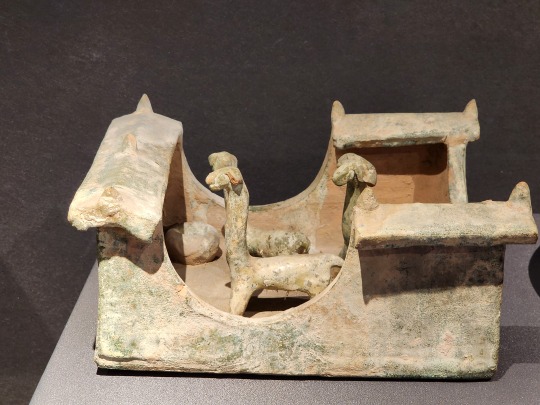
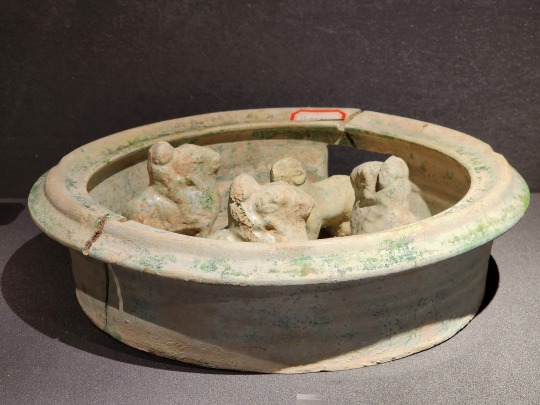
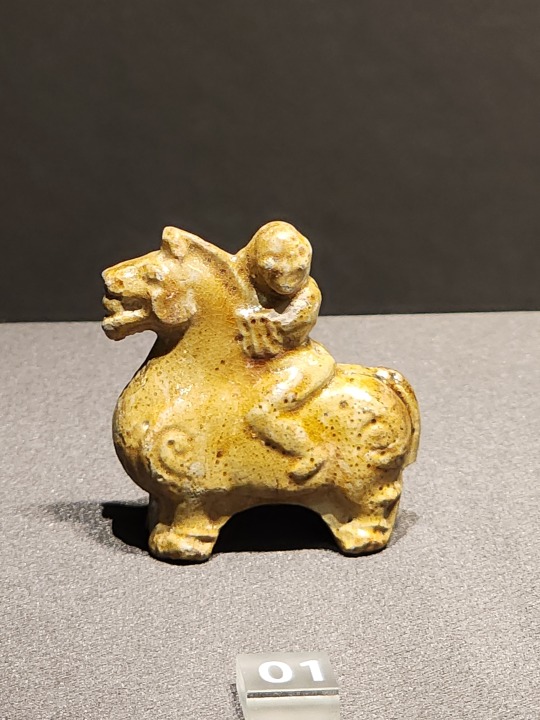
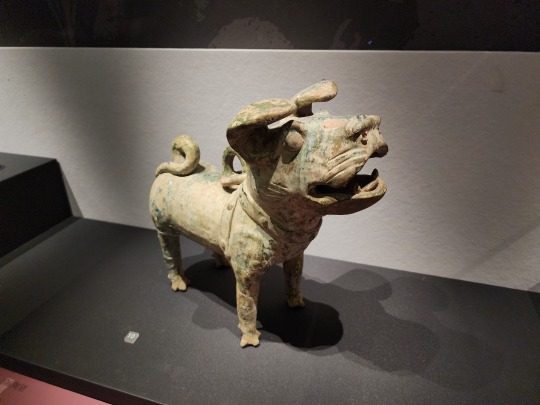
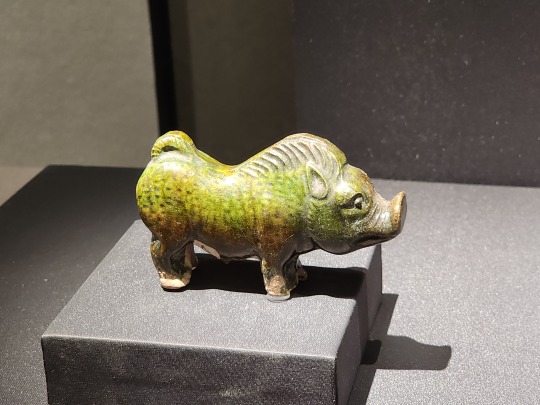
A life size gilded bronze silkworm. It goes without saying that silkworms were an important part of life in ancient China:
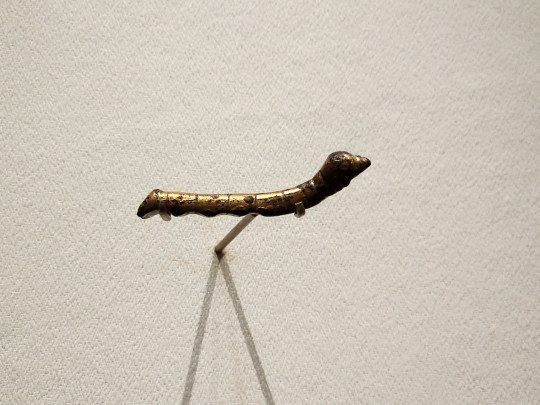
Left: Warring States period (476 - 221 BC) silver sitting deer. Right: a small figurine of a waterfowl eating fish
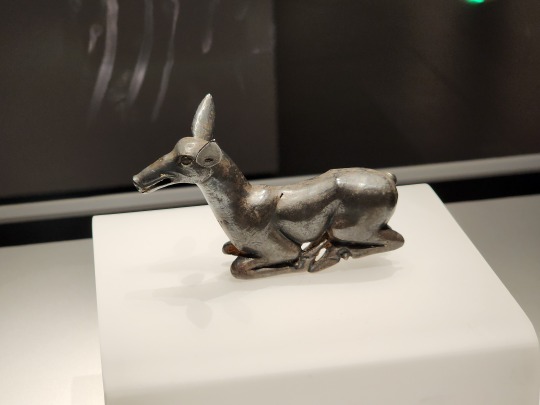
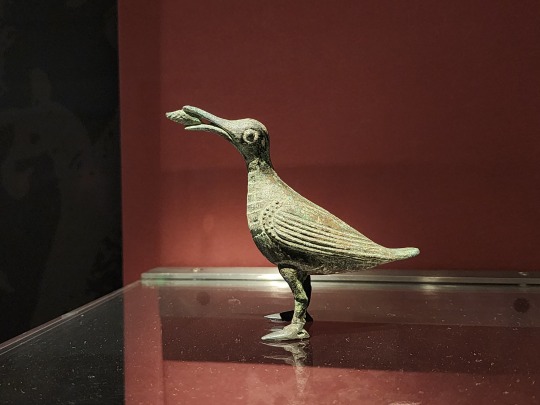
Diagram of the cattle-drawn ploughs used during Qin and Han dynasties. The 4 line drawings of different ploughs are taken from unearthed stone reliefs depicting daily life:
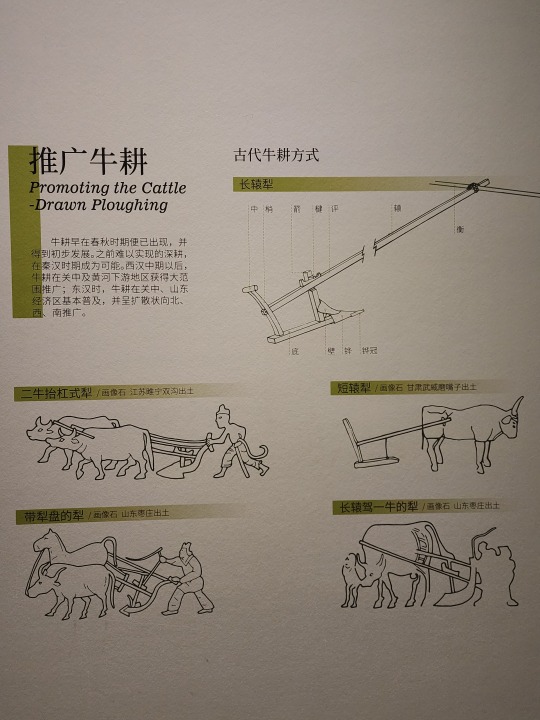
Eastern Han era (25 - 220 AD) "country estate" (田庄; not sure if "country estate" is the correct translation, but in any case many Chinese terms do not have exact equivalents in English, so even if this is "correct", it's probably the "close enough" translation) structure. This base-level societal structure remains without too much variation throughout the dynasties, and is the reason why people have defined imperial China's social structure as "feudal"--again, not the exact same as feudalism in Europe, since on a general overall political level imperial China (Qin dynasty to Qing dynasty) governs by centralization of power (中央集权制 in Chinese), but imperial China is "feudal" in many ways at the base levels of society, especially in terms of farmers and their relationship with land (their means of production; farmers may not always own their own land and may be forced to work for landlords). Side note: this is why people have proposed the statement "皇权不下县" ("the emperor's powers cannot reach below county level"), why farmers were the main force in many rebellions, and why tax reforms throughout Chinese history also had to do with land ownership (ex: Song dynasty Wang Anshi's Equal Tax Law/方田均税法 and Ming dynasty Zhang Juzheng's Single Whip Reform/一条鞭法; I will be touching on the latter in my future posts on the show Under the Microscope).
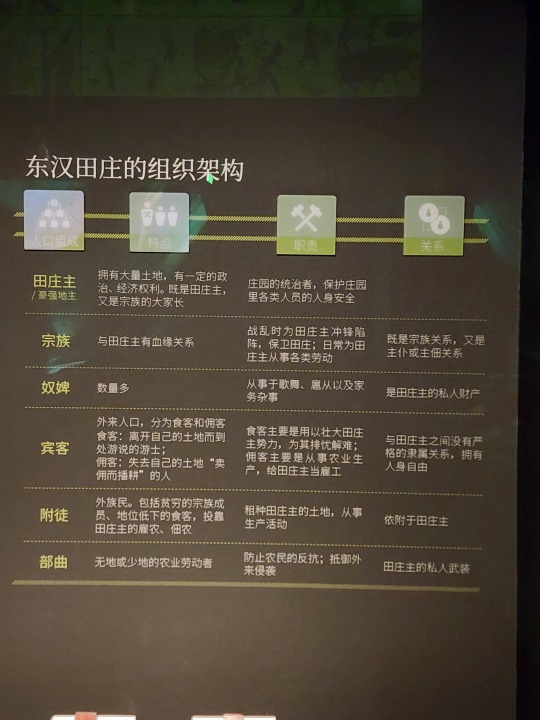
Peacock lamp, from the tomb of the famous Eastern Han dynasty official Yang Zhen/杨震:
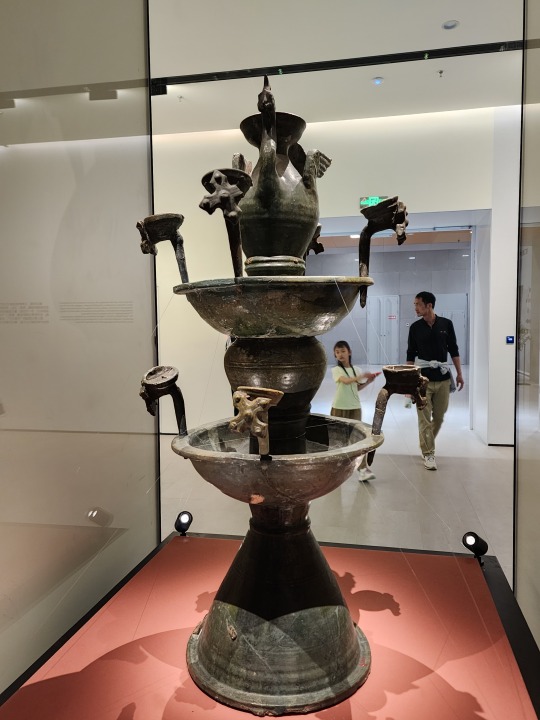
Map showing the spread of Buddhism and Christianity to different parts of the world by 600 AD:
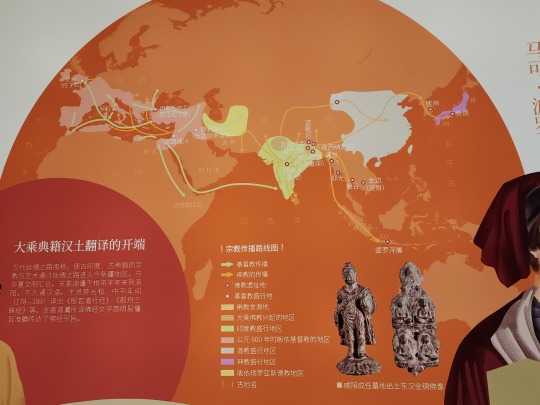
And lastly, this small part of a wall relief does a great job capturing my mental state after pulling an all-nighter:
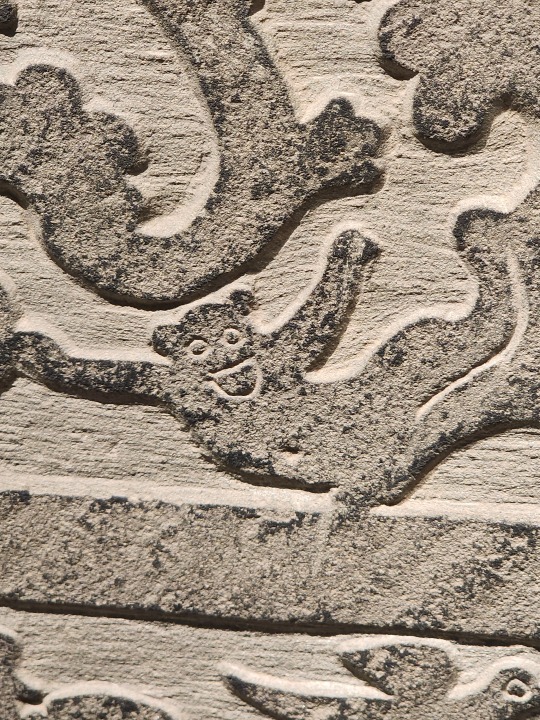
#2024 china#xi'an#china#shaanxi history museum qin and han dynasties branch#chinese history#qin dynasty#han dynasty#warring states period#chinese culture#history#culture
74 notes
·
View notes
Text
hgss hc — despite being from the sticks with a super thick johtonian accent, lyra has an extremely colourful personality! she loves collecting knickknacks, particularly snowglobes and coloured paper lanterns. her bed is covered in all her childhood toys its a miracle she, let alone silver or ethan, can fit comfortably. she loves mismatching patterns (particularly gingham and polka dots). she’ll wear fuzzy socks no matter the occasion. definitely a maximalist. her favourite colours are pink, red and purple. her favourite pair of shoes are either her cherry red platform mary janes or red high top converse. while she adores fashion and modern designs she has a deep love for traditional jothonian culture and has multiple kimonos in a wide array of vibrant colours. she loves cute lil guys like gudetama and pompompurin. her favourite sound is the cicadas singing in the summer. despite her room being absolutely cluttered she still manages to keep it organised especially the small shrine for her late father.
#i feel like her aesthetic perfectly matches her vibrant personality just a super bubbly girl#however i think she’s pretty stubborn and has a fear of feeling inadequate and weak#npc ethan and main character lyra for my hc!!!#hc#lyra pokemon#trainer lyra#pokemon#pokemon HGSS#HGSS
10 notes
·
View notes
Text
JTTW Chapter 33 Thoughts
Chapter 33 for the @journeythroughjourneytothewest Reading Group!
The German translation has some neat trivia for this chapter and its title! The “Heresy” [外道 wài dào] here refers to anything external, for example taking certain substances like the flesh of Tang Sanzang to become immortal.
Hey, an actual recipe instead of the usual ‘let’s steam him’. Nice!
Something I really appreciate the other translations for, they make it a little clearer who Silver Horn and who Gold Horn are, at least at the start of the chapter. Meanwhile the Anthony C. Yu version jumps right in with just referring the them as old fiend and second demon and such making it a little hard to discern who’s who if you don’t pay utmost attention or go back to the where it is first mentioned who’s who to double check.
I misread “Elder Gold Cicada” as Elder God. Reminds me of the artistic depictions of him as an actual cicada being, as someone who enjoys creatures and creature designs those are really cool.
I wonder if Sun Wukong knew they were being watched and did that little demonstration of his abilities because of that. Wouldn’t put it past him that’s for sure.
Also there is some character development making itself clear here! Last time they had trouble with a demon in disguise was with the Lady White Bone and that ended disastrously. So this time around Sun Wukong learned from that instance and plays along a bit instead of going for the kill right away.
He seems to just have really bad luck with mountains getting dropped on him. Aaand there’s the mountain trauma.
Though he used the mountain Sumeru, no? Shouldn’t Lingji from Chapter 21 be on there? Or is it a different mountain with the same name?
In general moving whole mountains like that prompts a lot of worldbuilding questions. How do the inhabitants of the mountain, be they human, spirit or animal, take that trip? What kind of damage does that leave in the landscape and does it get undone when the mountain is returned? We do at least get that the spirits taking care of the mountains are sort of under the command of the summoner, so that makes sense why they would allow it.
Love the use of star terms here, very fitting given it’s called the Sword of the Seven Stars!
Huh, so he doesn’t do thieving. Technically that’s classifiable as thieving since he made the little fiends hand them over willingly without the use of force or fear, whereas to commit robbery you have to take something with the use of those. Anyway fraud is fine apparently.
Also there is this illustration in the German translation for the storing up Heaven scene, which I want to show because one of the fiends looks a little like a bug, which I really like.

#xiyouji#journey to the west#jttw#sun wukong#monkey king#tang sanzang#Silver Horned King#Golden Horned King#jttw reading group#jttw book club
9 notes
·
View notes
Text
Ink and Bone AU update
First of all: reworking MK's design. No sketch yet.
Chinese dragons don't have wings, and I bet MK would have turned into one if he could so I'm pretty sure he can only turn into mortal animals. So they get replaced with Cicada wings.
The main concept for this idea is that he turns into animals he associates with his friends:
Pig hooves for Pigsy (back legs)
Cicada wings for Tang
Random scales and sharp fangs for Mei
And Sandy doesn't really have any visible non-human characteristics beyond Big and Blue so MK gets cat ears because Mo.
Besides that, he gets stuff from his kaiju form. 3 tails, sharp claws, long hair. Fur stays dark brown but eyes glow blue due to possession.
His clones also get mutated, but they draw on more from the powers he absorbed rather than going full chimera. Still get some kaiju characteristics tho.
Porty: takes more after LBD, wears a horse skull instead of rave shades and his outfit looks more like he got murdered in very over the top fancy winter clothes. I'm talking a whole ink-stained fur coat here. Long hair, fangs, sharp claws, tail is a lot more fluffy, think snow leopard levels of fluff. White hair.
Painter: takes after the ink curse, constantly melting and shapeshifting, but unlike the ink he has colors. Usually settles into having a monkey tail, medium length hair, and tattoo-like markings all over his skin. His hair and fur are black.
Delivery: takes after SWK and Mac, not all that different from monkey MK if it wasn't for the height. He is taller than DBK and gets bigger when upset. Hair is just a bit longer and has 2 tails and 4 arms.
Apocalipse: the only one to go full chimera like MK, but based on his enemies rather than friends. Imagine a spider centaur. His ears are pointed like the gold and silver demons', and there are glowing, moving bandages on the human parts of his body, like Mac's smoke monster. Arms are furred and resemble DBK's, though not as jacked. Hair stays the same lenght, but gains a purple-ish tint.
2 notes
·
View notes
Text
entry 001: arrival at hope’s haven [NOWHERE]
“The Girls”. I can just see the headline plastered on shiny streetside magazines, cloying for a cash grab. Perfect girlish cheeks gleaming in the innocence of youth… gone too soon. But something in those fragmented vignettes of pearly white smiles and homecoming queen hospitality told me I was…less than. Sophie, blond hair curled in hairspray-caked ringlets. Breanna in all her bronzed skin glory, trail of glass bottle florals so sickly-sweet, it rang of decay and molted flesh. Gabbie, attention-greedy glare hidden behind lacquered lashes and the latest fashion trend. And Riley. Riley Carter, the picture-perfect, all-American teenager. That glossy, presidential smile and cheerleader charm fooled all of you. She was a queen bee, alright, but she stung. Vicious and cruel, prowling for her next shiny new toy to break and discard. Riley- she was everything I wasn’t. But somehow, she looked at me differently. A look that ran through my insides and dug up the darkness. Like she could really see me, the lonely girl by the lake, drowning in my sketchbook. While other seniors my age spent weekends at the mall, or in a drunken haze wasting themselves away at sweaty beach parties, I sat like the ideal academic in my room, securing myself a scholarship for medical school at Columbia. I was the perfect daughter: dutiful, god-fearing… did what I was told. If only they knew.
Hope’s Haven Bible Camp, 1991. That splintered wooden sign advertised a sweet July escape, blistered skin days and balmy moonlit nights spent with blood oath friendships under the canopy of whispering pines. But those painted letters faded with the weight of a lie. The four welcomed me that first day on the camp bus, smiles as fake as their hard candy nails. A textbook loser like me hadn’t received attention like that and as much as I didn’t want to admit it, I craved validation so badly. After that drive over, I was a conjoined arm in their little clique, ear-witness to star-veiled crush confessions and every piece of midnight cabin gossip. Their effortless magnetism took me hostage with each inside joke, each whispered giggle as we snuck out to the beach for forbidden trysts with beer-breathed boys. Two weeks passed me by in a cicada-sung dream. I was even invited to their not-so-secret, exclusive bonfire parties; such that I bore witness to a fortnight of the perfect teenage reverie: pulling all-nighters in a canopy of smoke and the type of desired status you only heard through word of mouth.
But in the haze of that flickering flame the darkest parts of myself came to fruition. Because under the milky moonlight, like a dream so ethereal, so heady… there she was. Soft, luminous skin and a laugh that made angels weep. A playful grin so inviting… forgive me, I’m getting ahead of myself. Riley was a sin by design. Sometimes, her laughter suffocated the ache in my heart so painfully, I could see my sacrilege carved into my skin in the shape of her. I know she felt it too. Words unspoken, a tenderness saved for each other and a string between us pierced through our hearts that we’d been told to sever since childhood. Riley was everything, but she was untouchable, and wanting was the first step toward falling. She moved like she belonged there, with the stars and the endless sky. But I didn’t belong. Not with her, not with any of them.
As I looked to the edge of the trees, I saw it. A fawn, bathed in silver. Unmoving, unblinking, impossibly still. It just stood there, and something about the way its fragile limbs trembled in disquieted horror… I couldn’t look away. Not as its fixed gaze ripped the breath from my chest, watching, waiting.
0 notes
Text
Eating at...
An impromptu text written after eating at the restaurant Londo, in Ōtautahi Christchurch before moving to the UK. PDF designed by me for fun.
https://londo.bar
Eating at
LONDO(3)
Papa is a māmā.
After we finished our desert, my dad said he felt like he had been for a walk in the hills for the night and was arriving back at the car, wishing he didn’t have to go home. The last time I saw my parents, I told them we were moving to Britain; to go farming and vist standing stones, maybe live in the highlands and save some cash caring for plants so that C could make more work in the studio. A way to vacate our selves, or position ourselves elsewhere, requiring us to span a distance between our present and possible versions. We sought out how another piece of land, which knew our old people, might move us so.
Canteloupe is canned fruit salad and eighties holiday sunsets. Anti-anxiety herbal remedy in the first course. Granita disappears and comes back in the pasta. First pork in five years. Blooded salt, melonwater running.
A friend has started their PhD to understand how manipulations to the environment of carrot crops on the canterbury plains can speed their biennial seed cycle. Grow a strong root one year, send up great umbels of flower to set seed the next. A big investment. Canterbury’s immense stakes in the global carrot seed market makes for an abundance of research funding in the area.
Carrot as speculative capital. Dusty. Aniseed sweet. Of a certain age. Ryegrass gone silver in 4:33pm light. Will be a different shade tomorrow. Carrots have been simmering in that pot for years now. Lorna got married last week! Jewelled rods accross the plate. One of these days the chestnuts will be full and ripe enough to make pie. Caramel roots buoyed by romesco; whatever ectasy that is. Sit down, saucepan in the middle, over-ripe toms and the last basil. Talk for hours.
In Riverton we bought a few tiny Urenika seed potatoes. More like shrivelled yams than our idea of potatoes. I put them in the ground before Christmas and as the zuchinnis paled and powdered themselves I dug up the smallest bowlful of finglerling tubers from the mass of stems. I had to leave thousands of tiny siblings in the ground — marbles who turned glinting, giggling, glassy when rinsed. The following Feburay my flatmate got excited about putting winter greens in and dug up the potatoes that had grown from those abandoned gems. Twice as many, twice the size. Sometimes doing less is better. The tohunga who had these for dinner for centuries really knew what they were doing.
Sailing a crisp across Lake Buttersauce. Invisible sechuan heat tempered by lemons. When well-boiled, they hold a texture of sandy loam that melts in contact with saliva. We attend a soil cupping. Notes of burnt sugar and echinacea. Abstracted, well-seared cow rectangle galumphs around the table awaiting affection. We take the potatoes for a victory lap.
Buckwheat filled the garden bed with paddly green leaves until it was warm enough for the tomatoes go in. Hearted leaves now dangle yellow on jointed scaffolding. Once chantilly cream dollops attracting hoverflies and floating in the breeze on reddish stems, the flowers have become seeds; pyramidial, black.
When husked, their stony, roasted innards are steeped, syruped, and whipped frozen with cream. Toasted barley tea. Infintely more than bread and beer. The land given maximum and methodical love that it may return; animate. Not just land but lond. From before. Not just papa but Papatuuaanuku. The soil and the waters. Your islands or mine. We go deep into the tunnels to leave our offerings. Can I make a golden silk from this carrot, a cicada’s worship in a cup? Fill it up. Now cannot be before. Look after the new growth in th old place.
When we sat down to dinner my mom handed me a brown envelope. This dinner was my birthday present and I knew there would be a small card. My parents are reliable in these formalities. Small theatre. Inside the card my father had written in his quickest, way-out-the-door handwriting, “You are going to fly away. Take me with you.”
A low, 5:53 lemon sun and the crunch of another evening.
Rats eat the fallen walnuts overnight.
Pull the drapes
0 notes
Text
Dale of the Dales: Part 2
Dale had failed to mention that he’d made a whole spread. The shepard’s pie was there, but so was some unholy mixture of cheese and potatoes, something that looked like fried green beans, some kind of orange root that was both leaking syrup and coated with marshmallow, as well as a gel that would’ve looked more at home in a wizard’s lab than on a dinner table. It was orange for Gods’ sakes.
Aaaaaand the human was putting whipped cream on it. Wonderful.
(The pie, at least, had been divine. Alfonse could easily admit that.)
He tapped his fingers on the table nervously.
“I think I was braver a minute ago. I’m starting to realize how insane it is to talk about my late wife with someone I’ve known for two minutes.
Dale half-startled. He’d been very intently shoveling the root-mallow mixture onto his plate, and looked slightly annoyed at being interrupted.
“Hold your horses there son, I’m still servin’ myself up some-”
He froze mid-sentence as he actually processed what Alfonse just said. His face flushed red and he stopped a second time.
‘Aw hell. Sorry, my stomach got to my mouth ‘fore my brain did. Look: That’s just them negative-two drinks in ya talkin’. I’m gonna talk about my wife with someone I’ve known for two minutes, and I ain’t crazy.”
Alfonse eyed him, then the translucent orange slime, before raising an eyebrow.
Dale followed his gaze and let loose an exasperated sigh.
“Just try some, you half-pint fussbucket. I been part of caravans haulin’ crates of candied cicadas to Gnicaea. If your royal shortnesses can eat thems, you can eat these.”
“I am going to point out that those are delicacies for eccentric gnobles.”
“Yeah, and jello is a delicacy for eccentric farmers. I seen your hands Alfonse, you gonna claim you got them calluses from balancin’ budgets? Playin’ harpsichord?”
Alfonse stare met Dale’s for more intensely than the latter had been prepared for. Something about that line clearly hit a sore spot. Tension crackled in the shared gaze but Dale refused to break eye contact.
The tension melted out a little slower than it arrived. It took Alfonse’s shoulders several seconds to fully relax. When they bobbed back up, Dale braced for another surge of anger only to realize that the little man was only making the best shrug he could in his overwrought full plate.
“Alright. You’ve made your case: I’ll try this... this…”
“Jello.”
“Yes. Jello. I will have a bowl. Just a small one though, if you give me another human sized portion I am almost positive that I will puke.”
Dale grinned victoriously and busied himself getting a clean bowl from the kitchen. Alfonse took the moment alone to look over the room. His attention had divided between his food and his host, he could practically feel the breath of his first sergeant on his face, screaming at him for neglecting his surroundings.
Which, he had to confess, were beautiful. Gnomish styles were flashy, designed to display (or at least, suggest) an abundance of coin. The human style was hardly demure, but it didn’t seem to measure riches in gold or silver, but time. The materials were just simple enough, just wood, brass, and plaster, but there were no cut corners to be seen, no indication of any impatience on the craftsman’s part. The symmetry, the details, the perfectly applied finishing...They all suggested something rarely seen in gnomish construction: Love.
At once that clicked, it became hard to miss. The building itself was a love story, one he could read just by paying attention.
The walls weren’t just a flat white from the plaster, they were shimmering. Ground glass or even porcelain must’ve been added to the mix when it was still wet, a small extra cost that underlined the builders eye for detail.
Yet, even if it would’ve been beautiful bare, it was still given ornamentation: The wall in front of him was painted with a straight path running through a vale of aspens, stretching on and on before disappearing into the sunset. If he squinted at it, he could make out a feminine silhouette almost disappearing over the horizon, half buried in the sinking sun. Her arms were out in a way that made it hard to tell if she was reaching forward or beckoning back.
The simple sadness of it made his gut ache. It wasn’t hard to guess who that woman was.
Almost every wall had a scene of some kind on it. Some were simple patterns, blooms of wildflowers or geometric tessellations. Others seemed to have been made to commemorate specific events: There was a scene on the ceiling of grackles flying into the clouds, a small empty nest in the background, that he found particularly affecting. It was easily the worst fared of the bunch, the colors dim, and the paint itself cracking through in several places to reveal the plaster underneath.
“Yeah, these ain’t supposed to last more than six’er’seven years. Been closer to fifteen on that old boy but I still can’t bring myself to paint over it.”
Alfonse almost jumped out of his chair. How focused had he been, that a literal giant could walk up to him with a bowl of neon slime and still go unnoticed?
Dale ducked his head apologetically.
“Sorry, din’t mean to spook ya. I was more used to announcin’ my comin’s and goin’s when I was younger, been some long years since I could sneak up on anyone. Little folk normally got big ears, otherwise them owls getcha.”
Alfonse spent more than a few seconds preoccupied with the owl comment before deciding to focus on the painting itself.
“If you’re painting on top of plaster, why didn’t you make it a fresco? Those last for centuries.”
Dale scratched the back of his head.
“Ehh, things are at their most dead when they can’t change. Tryin’ too hard to make somethin’ last forever kills it just as fast as time woulda. Faster even. Somethin’ that lasts forever goes stagnant soon as the construction’s done. That’s the closest thing to stillborn art can get.”
He noticed the gnome’s wide eyes looking up at him in surprise and shrugged.
“And if that’s too phil’sophical forya, frescos just ain’t as bright as the direct paint is. I like bright colors. Not sure ya caught that yet.”
His eyes moved meaningfully to the fluorescent jello and Alfonse snorted. It was as jarring as any tone shift as any he’d ever heard.
“The way you leap from serious to ridiculous...Is that a Dale quirk? Or a human one?”
The giant gave him a crooked grin even as he pulled up his chair.
“You tellin’ me you’ve never gone from laughin’ to cryin’ and back again?”
Alfonse stopped a moment to mull that over.
“I have...But I think you would be surprised at how long it has been since I did either, even separately. Maybe it’s time I pushed myself a little bit.”
Dale’s ears practically cocked up, but he kept his voice even.
“Yeah?”
“Yeah. You’ve loosened my tongue with this vile brew-”
“-It’s just jello.”
“And now you’re going to have to sit through this old man’s story of love and loss.”
Alfonse looked at Dale for half a second longer, waiting for him to interrupt again. Content that the other man was holding his peace, he began to speak.
“Her name was-”
“Sorry, shoulda said it earlier, but if you’re a week over fifty, I’ll eat my damn hat. Old man my ass.”
And for the first time in months, Alfonse felt himself begin to laugh.
Dale of the Dales: Part 1
The Dales were home to the hillfolk, a happy people, but also the only group shorter than the gnomes. Commander Alfonse Sprocket had been prepared to discuss the surrender of Honnillee with someone quite a bit… shorter.
“Welcome, welcome, how do you do? I’m Dale Chesher, named after these self-same lands, yessiree. Something to drink?”
The situation was so surreal that he didn’t fight against the warm mug of tan liquid forced into his hand. He took a sip and winced: The tea was far too sweet, syrupy even.
Alfonse hadn’t actually met a human before this moment. Apparently, they didn’t take to the altitude of Gnicaea very well. Most of the trade the two cultures experienced came second hand from the dwarves, who were friendly enough, but prone to exaggeration. When he’d heard the dwarves talking about the scale of a human, he’d written it off as a cultural tendency to lionize their friends.
Apparently, he had failed to give his fellow mountain-folk appropriate credit. The man in front of him was easily twice his height, and thrice his breadth.
“You’re the mayor of this town?”
Dale shrugged.
“We got maybe a hundred folk down here in Honnillee, we ain’t nearly so formal as that. If someone needs to be in charge for a spell, we let em’, but it ain’t a lifelong deal. Titles go to yer head like cheese goes to yer thighs, that’s a Chesherism, free-a-charge.”
He swept a hand towards the dining room, cutting off the Commander from further interrogations.
“If you got any more questions, it’d be easier to ask them sittin’ down. If the Gods wanted me to spend my life standin’, they wouldn’t have given me such a soft ass, that’s a second Chesherism for ya. Our folk don’t dine much together, more’s the pity, so we’ve got two options so far as the table’s concerned: We got a booster chair you could use to sit at my very own personal dining set, carried all the way from the Malantai, or I could sit criss-cross-applesauce here at a table that the Midford’s lend me for the evenin’, bless their teenie-tiny hearts hearts. You’re the guest; choice is yours. ”
The avalanche of words was hard to keep up with. Worse, the man didn’t even seem to be doing it on purpose: His face was placid, almost serene, and his every movement had a sort of lazy-summer-sluggishness to it.
He could do this all night. Alfonse, on the other hand, could feel his strength draining with every moment he wore his ceremonial armor. He was supposed to come here armed to the teeth, plated in silver, an angel of war in a land of peace. He was supposed to be terrifying.
Craning his head almost forty-five degrees up just to make eye contact did not make him feel very terrifying.
Less than thrilled by the prospect of craning his neck the whole night, he weighed his options: He could accept the use of the booster seat, which would put him at eye level, although he wasn’t sure how he would manage to get up there. Perhaps a ladder would be produced? Or, if none were sturdy enough to handle him in full armor, perhaps a ramp?
Alternatively, he could use the standard size table, which would leave him with an aching neck to match everything else.
Easy choice.
“I would like to use your dining set, Master Chesher. The craftsmanship is remarka-”
He was cut off mid-sentence as Dale casually scooped him up, crossing the entire room in three easy strides before dropping him casually into the chair. The indignity of it was almost as infuriating as the casual display of strength was intimidating.
Almost.
Fear held his temper in, but it did little to curb other emotions. His mouth was desperate to say something about what had just happened, and the odd lingering smells in the upholstery of the seat gave it an outlet.
“I...Why does my chair reek of boiled peas?”
Dale shrugged, slightly embarrassed.
“Ah, well, normally this here seat is used by babs still sprouting their fangs. Boiled peas and carrots are delicacies for em’, but you know how it is when you’re feeding a ween, they wind up wearing as much as they eat! And they eat a good deal sir, a very good deal, humans don’t get this big by being dainty-like. Been a long time since I’ve had any runnin’ around the house though. Miss my little scamps.”
Ah. So this was a child’s chair. He hadn’t counted on that. He deflated in his chair before forcing himself up right again, consoling himself.
Ah hell, it wasn’t like the shock and awe had been working well anyway.
“I see. Well, Master Chesher, are you ready to discuss the details of your hamlet’s surrender?”
Dale winced.
“My boy, I done told you: I ain’t a mayor and Honnillee ain’t mine. It ain’t anyone’s. Only people with any claim to the ground near here at them that’s buried underneath it, there’s a third Chesherism for ya.”
“I am not a ‘boy’, and we’ve heard this claim from the hill-folk before. All that you’ve said is both well known, and highly contrary to how Gnicaea sees things. This document isn’t going to write itself Master Chesher, so if you would quit stalling and-”
Dale exploded up, his chair miraculously keeping its balance even as it slid across the room and slammed into the wall.
“It’s called hospitality, Alfonse, and you may not get our ways but under this roof you sure as sin are gonna respect em’! Now this is how our evenin’ is gonna go: We’re gonna eat our vittles like civilized-folk cuz I’m an old godsdamned widower and I baked you a shepard’s pie with the late wife’s recipe, first time I done touched an oven in ten years, and I cried into it thinkin’ about her, so you owe me big for that, you hear? Then, we’re gonna have two drinks apiece out on the porch because it is a nice summer evenin’ and a man can be too sober for a thing just as easily as he can be too drunk, and you sir strike me as a man that’s been two drinks too sober since he was born. We get those done, evenin’s yours. And if you even think about talkin’ any more business before those’re done, I swear, I swear, I’m gonna hang your shiny metal ass off that chandelier over there and leave you there until the sun doth rise or my house doth burn, whichever comes first. Are we clear?”
Alfonse blinked once, twice, three times. He’d been in the military a long time, climbed his way from boot camp all the way to the top. He’d been happy enough when he reached a rank where he didn’t get reamed on the daily, but it’d been so long that he’d dealt with anything besides excessive ass-kissing that he didn’t know what to do. To be honest, it was actually pretty damn refreshing.
He realized that Dale was still waiting for him to speak.
“Crystal clear, Dale. Just got one question for you.”
The human glared at him, suspicious as he’d ever been.
“Yeah? What’s that?”
“Does it get any easier?”
Dale’s face twisted up in confusion.
“Does what get any easier? Bein’ an old grump? Every damn day.”
Alfonse scratched the back of his head. Yeah, that hadn’t been a very clear question.
“No. Being a widower.”
There was a pause as Dale searched his face for any sign of lying, even a hint of manipulation.
He couldn’t find any, and the suspicion gave way into a begrudging sympathy.
“Ah. No. You just get stronger. Gimme a moment, this’ll be easier to talk about while eatin’ pie.”
Alfonse nodded, watching as the giant left. He was surprised at how empty the room felt without him. They’d barely been talking for two minutes, and he already felt closer to this stranger than he’d felt with anyone back home in years.
He had a moment to think back on how the dwarves described humans, beyond just their height, and couldn’t help but marvel at the accuracy. To think that this was the one thing you could trust a dwarf to be honest about. What was the phrase that he’d heard at the tavern, all those years ago...
Humans bond with strangers like they’re friends, friends like they're family, and family more than life.
He wondered where he stood on that list. It'd been a while since he'd had a friend.
#fantasy#writing#creative writing#gnomes#the gnome puns in this get pretty egregious#gnicea? come on#and at some point I reference gnobles#humanity fuck yeah#humans are space orcs#except somethings they're just ground orcs#hfy#i like the idea of giants having southern accents
92 notes
·
View notes
Photo
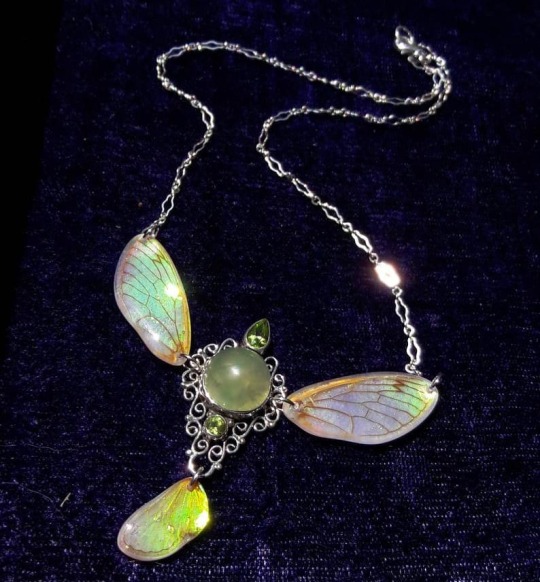
I'm always trying to come up with new #designs for wings! This necklace features three color shifting wings from a 17 - year #cicada, scientifically known as the #magicicada! #Prehnite and #Peridot #gemstones are set in sterling #silver in the center. 💚 https://www.etsy.com/listing/767678312/ https://www.instagram.com/p/B9FPCUznv1Q/?igshid=1d3ilndwm5au3
1 note
·
View note
Text
fox face bag
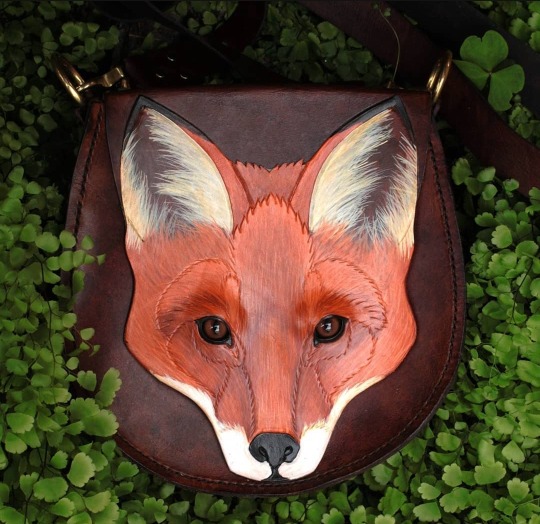
This was the test piece for my glass eyed purses. I wasn't 100% happy with the magnetic clasp and the glue adhesion on the flap so I kept it as my every day carry. It's lasted me years. But now the face is peeling up and the magnet is pulling away. I have much better construction techniques and u thinknits time to make another bag for myself. Should I do a fox again or another animal face? Maybe something different all together?
3 notes
·
View notes
Text
Monkey King Reborn (2021)
After what, 100 years?? I finally watched 西游记之再世妖王 | JTTW Return of the Demon King! Or Reincarnation of the Demon King. And I learned that both those titles are wrong now LMAO The OFFICIAL English name is now Monkey King Reborn (it has nothing to do with Nezha Reborn however).
Watch here (Chinese subtitles only)
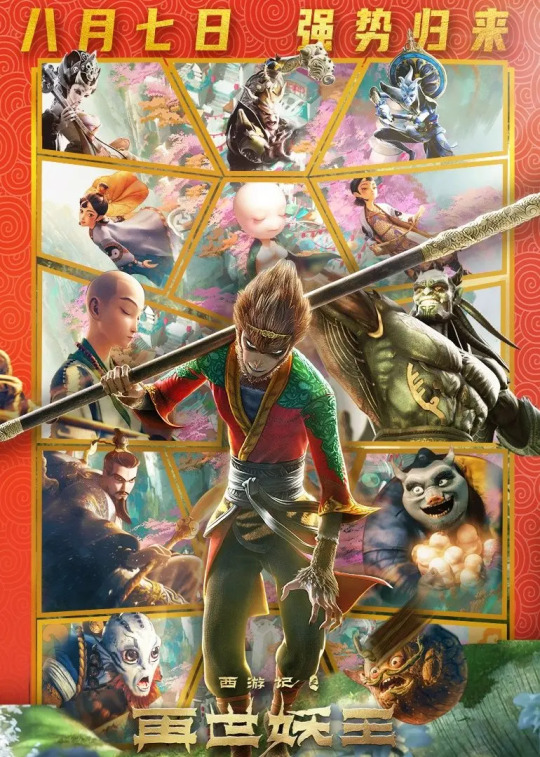
So I wasn’t really expecting anything fantastic since the movie didn’t exactly do anything groundbreaking for audiences in mainland China when it was released back circa April. Critical consensus was that it’s OK, not the worst thing, but not a “good” film. Objectively, that’s probably right LOL this is by no means on the level of Monkey King Hero is Back (2015) or Ne Zha (2019). Structurally, it’s also not as paced as Nezha Reborn (2021). My thoughts:
Compared with every other animated and online JTTW film we’ve had since 2015, it’s a Masterpiece. Could be better, but was surprisingly watchable and has enough going for it to override the flaws. Tonally, it’s all over the place asdfasdf. Hero is Back + Ne Zha + JTTW17 + Netflix Kingdom + AVENGERS ENDGAME. (*More on this below the cut because I am not exaggerating.) Don’t go in expecting an award-winning script and it’s really entertaining.
Basic plot: Centuries ago, the Golden Cicada used his spirit to seal the demon king, Yuandi (the first demon TM), under the earth. The rensheng tree grew from that energy and Zhenyuanzi has been in charge of it since. The pilgrims come to Wuzhuang Temple per canon, get into baby fruit shenanigans, and Wukong destroys the tree. Yuandi escapes and steals Sanzang, meaning to consume his essence. At the same time, the tree’s own life essence takes the form of a living baby fruit who claims to be the pilgrims’ only hope of sealing Yuandi.
Some jokes actually made laugh though (watch out for a hilarious take on the silver horn/gold horn arc). Favorite one was this:
Bajie: “You almost scared me to death!” Wukong: “Then die.”
And this:
Yuandi: Who’s Sun Wukong? Some kind of monkey!? Minion: Yeah, he is a monkey! How did you know?
The pilgrims are the film’s strongest suit. They all had their unique personalities and never once do they try to undermine each other. I think this is the first time I’ve seen a jttw film where the pilgrims were a solid little found family from beginning to end. The disciples genuinely loved each other, loved their shifu, and vice versa. Which is Wild because you can’t tell that they were this loyal a group from the trailers. So that was a nice surprise. They really were like, a family that goes west together DIES TOGETHER.
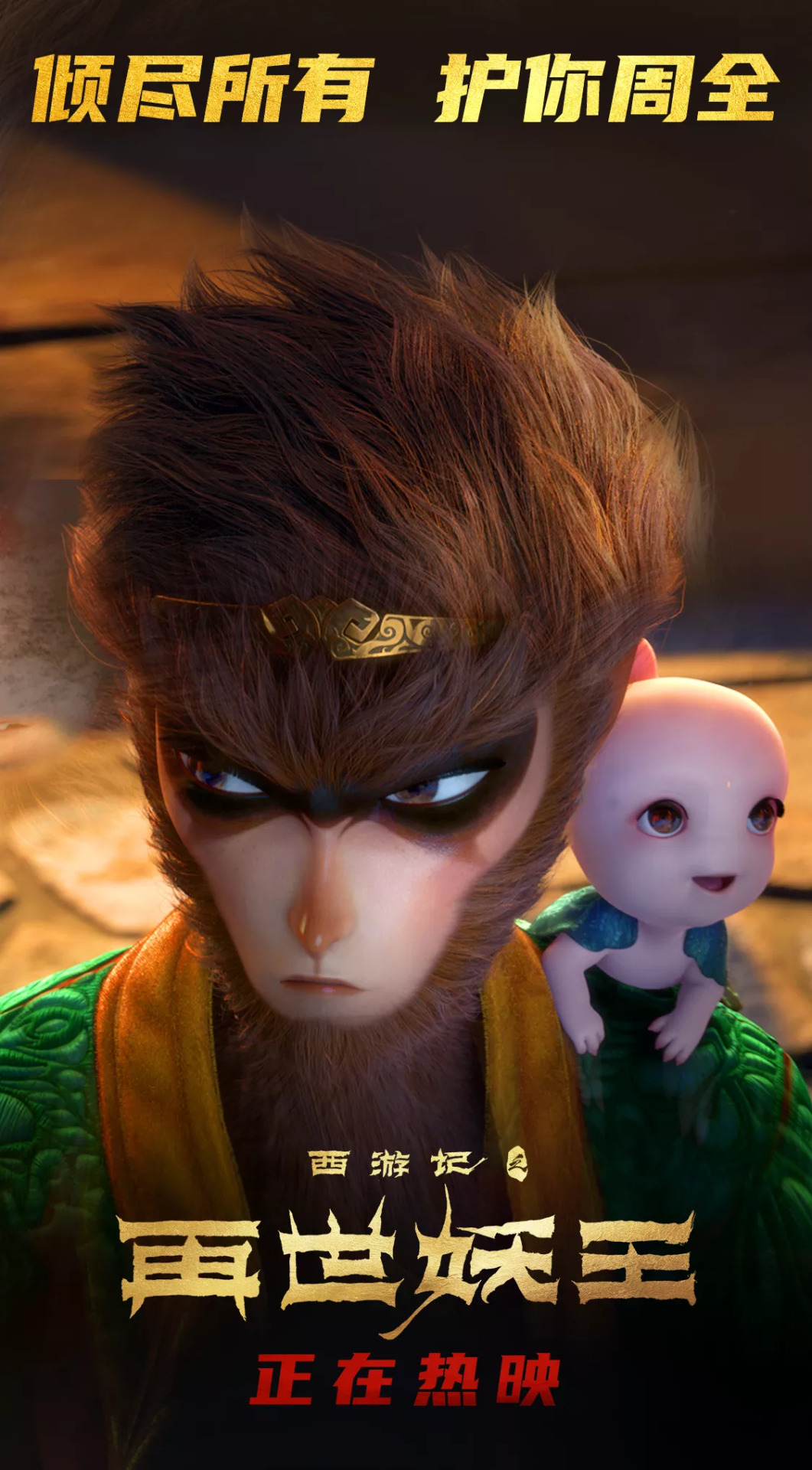
1) Sun Wukong. We’ve been waiting on 21!Wukong’s personality since forever and I can confirm that it was worth it. He resembles Kenny Lin’s 17!Wukong quite a bit (and the design totally plagiarized 15′s) but he overall feels like his own character. He’s more of a punk than an emo lol; confident, snarky, cool (but it doesn’t stop him from getting peed on by a piece of fruit). And surprisingly mature for someone who also has a reckless temper, so this was a pretty successful adaption of him. His voice isn’t what you’d expect (the character has monkeyish moves but the voice doesn’t seem animalistic), but when you get used to it, it’s.. good. Just wish the VA could go even louder during the climax.
**I guarantee 21 will awaken something in some of you.
2) Zhu Bajie. He was literally himself from the book. A gluttonous pervert, which was surprising because animations usually remove the lust part LOL. Literally a complete pig as lazy and indulgent as you’d expect, but also Wukong’s #bro to the end. And there’s a cool show of his powers in the third act. A great Bajie.
3) Sha Wujing. This Wujing is amazing and I cannot stress this enough- he is a NERD. A bookworm. He carries one of those scholar backpacks filled with books and scrolls, so he can read aloud to his brothers and share cool trivia with them. Blown away by this take on Wujing. He’s not even a big or intimidating demon- he really looks like a fishman here, and once again, he is a NERD. FANTASTIC WUJING.
4) Tang Sanzang. I like the design- they remembered that he’s supposed to be a beautiful monk TM. But he was barely in this film?? The big bad kidnaps him within the first 15 minutes and the rest of the movie is about the disciples going to rescue him. From what we do see though, his personality kinda resembles Sanzang’s from A Chinese Odyssey LOL. Always believes in the best of their group. Ditzy, but genuinely loves his disciples, which you don’t always see so obviously in jttw adaptations.
One Big change here is that Wukong is the disciple Sanzang’s always indulging instead of Bajie. Pretty clear that Wukong is his favorite in this one ;)
5) Bailong. The horse’s eyes are distinctly dragonlike and his mane too. But ALAS, the filmmakers forgot about him after the intro. Ao Lie really nowhere to be seen after Wuzhuang asdfasdf
The animation wasn’t perfect. I felt like they were skipping frames in the beginning, and it’s very obvious that the budget went into Act 2-3. Just a lot was going on. There’s also an obvious difference between the quality of the main cast and the nameless side characters LMAO. But the ending makes up for it imo.
Pros:
Solid characterizations
The pilgrim bond TM
Every time Wukong pulls the staff from his ear, it looks Cool
There’s a rendition of the Bimawen theme! And when the disciples visit a random village, everyone reacts to them like they’re monsters, as they should haha
A truly sick version of the 1964 Havoc in Heaven theme (instead of Dagger Group Prelude) when Wukong powers up at the very end; not going to spoil it, but his design in that scene is pretty cool too
Watch past the first credits for the Guanyin cameo! She’s buddha-sized.
Cons:
No pacing. Things happen so fast with no transition asdfasdf. Unless you’re alerady connected to the characters, I don’t blame you if you don’t feel anything because the movie doesn’t stop long enough for you to.
The movie’s message is about how demons can choose to be good or evil. But that’s not a lesson the disciples actually had to learn because they just weren’t bad people at any point in the film LOL like, they were ready to die for a sentient fruit. they already worked out all of their problems before the movie started so who is learning what
The... style of the movie?? We went from an accurate portrayal of the baby fruit arc to Monkey King: Hero is Back to Avengers Endgame...
The villain’s initial look was interesting. Then he reached his “final form” and he honestly is Zack Snyder’s idea of a jttw villain. He talks, acts, and looks like one.
They tried very hard to make the baby fruit endearing, but I just found it disturbing and I was glad when it “died” adfasdf
Things that make you go “eh?”:
Yuandi is the Demon of demons that everyone has heard of. Except Wukong for some reason. I also don’t know what Yuandi’s so smug about since he’s not the one who caused havoc in heaven. The lack of respect smh
Wukong’s temper was inconsistent (for me personally); he seemed to overreact a lot at Wuzhuang, but was perfectly “mature” for the rest of the film
Worldbuilding was hard to follow, especially why Yuandi kept Sanzang alive instead of eating him immediately, the Golden Cicada’s connection to the talking baby fruit, and why the disciples are soooo fond of that thing in the first place. I just do not get it.
The baby fruit is a cannibal- it eats other fruits to rebuild energy LOL
Things that make you go asdfasdfa (SPOILERS BEWARE):
The first half of this movie is family-friendly. Even the part where Yuandi’s minions zombify a village- it’s all very PG. Then in the climax, Zack Snyder takes over and Yuandi kills the disciples on screen. He MURDERS Bajie and Wujing right there for us to see.
Then he spends like, 20 minutes, beating up Wukong. It’s not super graphic (I think?), but the monkey is literally coughing up blood in this animated movie???
Yuandi also “kills” Sanzang by taking the Golden Cicada’s essence in front of Wukong after he spent 20 min beating him into a pulp asdfadf. And at that point, literally all the pilgrims (except Bailong who was forgotten) die on screen. After Yuandi kills the baby fruit, it gives itself to Wukong and he powers up enough to beat Yuandi. It doesn’t have the feeling of the tragic comeback from the finale of Hero is Back, but it is very pleasing to see happen anyway. Also because that Havoc in Heaven electric guitar theme SLAPS.
Then the pilgrims come back to life because baby fruit powers. And we’re like, “damn, zhenyuanzi was right. the fruit tree is special!”
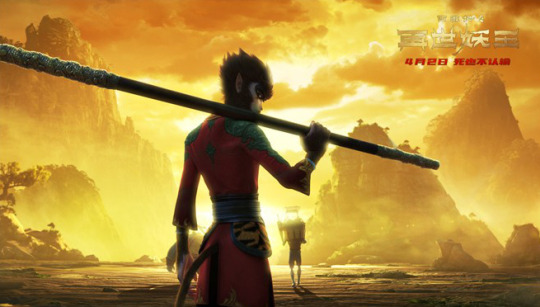
And this is the final shot of the movie (before the first credits scene). The classic Sun Wukong-looking-over-shoulder parting shot!
Overall, 6/10. Not the best, but certainly not a bad JTTW adaptation.
#journey to the west#journey to the west reincarnation of the demon king#journey to the west return of the demon king#monkey king reborn#monkey king#long post#I'll keep an eye out for eng. subs for everyone interested!#the version I watched only had chinese subs#had to come on here and punch this review out before dipping asdasdf
409 notes
·
View notes
Photo
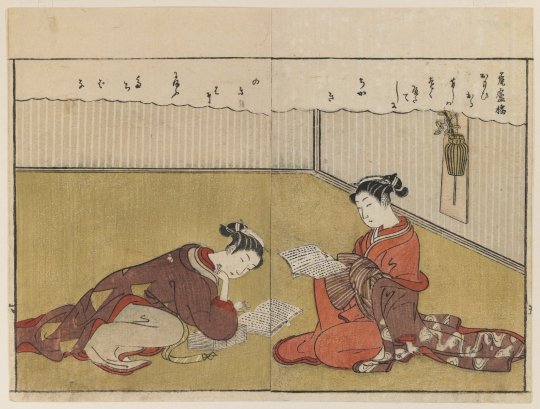
Closing out National Poetry Month, our Spring Interns paired some of their favorite poems with works from our collection. We hope you enjoy!
— Jeffrey Alexander Lopez, Curatorial Intern, American Art & Arts of the Americas
Image: Suzuki Harunobu (Japanese, 1724-1770). Page From Haru no Nishiki, 1771. Color woodblock print on paper. Brooklyn Museum, Gift of Peter P. Pessutti, 83.190.1
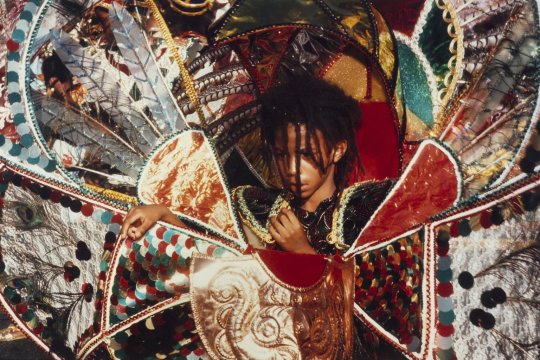
from Citizen: “Some years there exists a wanting to escape...” [Excerpt] By Claudia Rankine
/
I they he she we you turn only to discover the encounter
to be alien to this place.
Wait.
The patience is in the living. Time opens out to you.
The opening, between you and you, occupied, zoned for an encounter,
given the histories of you and you—
And always, who is this you?
The start of you, each day, a presence already—
Hey you—
/
— Halle Smith, Digital Collections Intern Catherine Green (American, born 1952). [Untitled] (West Indian Day Parade), 1991. Chromogenic photograph, sheet. Brooklyn Museum, Gift of the artist, 1991.58.2. © artist or artist's estate
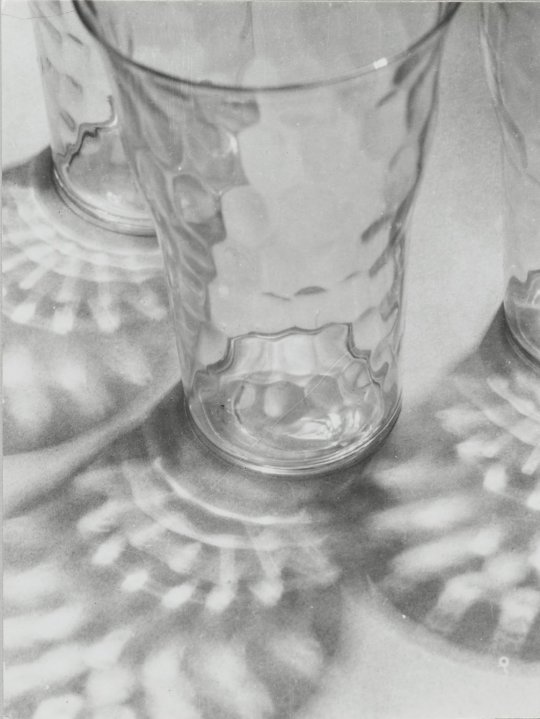
Ode to Enchanted Light by Pablo Neruda
Under the trees light has dropped from the top of the sky, light like a green latticework of branches, shining on every leaf, drifting down like clean white sand.
A cicada sends its sawing song high into the empty air.
The world is a glass overflowing with water.
Consuelo Kanaga’s black and white photograph captures a dazzling, yet fleeting moment from everyday life. Three textured glasses cast shadows whose patterns are almost kaleidoscopic in effect. We can imagine Kanaga passing by her kitchen table, as she is brought to a halt to take a closer look at, and ultimately to photograph, the simple beauty generated by the play of light and everyday objects. The close-up scale of this image emulates the singularizing framing techniques deployed by Surrealist photographers, who also took parts of everyday life and blew them up in the photographic frame, thereby encouraging their viewers to look at life around us from a different angle. It is a way of saying: Here, take a closer look. Viewing the world with wonder, along with the joy that this act brings, are encapsulated in Pablo Neruda’s poem Ode to Enchanted Light. The speaker observes the way light passes through trees and creates enchanting patterns. He not only observes, but feels the beauty in the simple details of life, from the way light falls from the sky, to the sheen of leaves, to the buzzing of cicadas. Approaching life through such a hopeful lens evokes a glass-half-full perspective. In fact, the speaker is so hopeful that he believes “The world is/a glass overflowing/with water.” I think Kanaga would have felt the same way.
— Kirk Testa, Curatorial Intern, Photography Consuelo Kanaga (American, 1894-1978). [Untitled] (Glasses and Reflections). Gelatin silver photograph. Brooklyn Museum, Gift of Wallace B. Putnam from the Estate of Consuelo Kanaga, 82.65.25
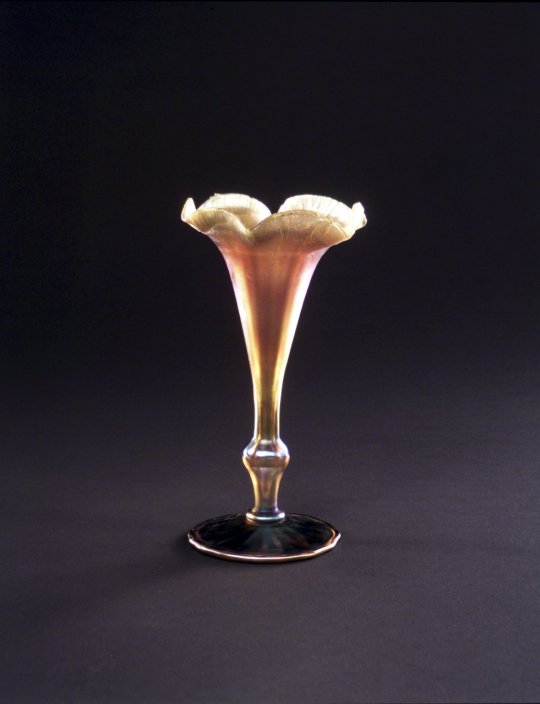
Easter Wings By George Herbert
Lord, who createdst man in wealth and store,
Though foolishly he lost the same,
Decaying more and more,
Till he became
Most poore:
With thee
O let me rise
As larks, harmoniously,
And sing this day thy victories:
Then shall the fall further the flight in me.
My tender age in sorrow did beginne
And still with sicknesses and shame.
Thou didst so punish sinne,
That I became
Most thinne.
With thee
Let me combine,
And feel thy victorie:
For, if I imp my wing on thine,
Affliction shall advance the flight in me.
Easter Wings by George Herbet and Martin Bach’s flower vase from the Brooklyn Museum’s Decorative Arts collection reveal the interrelationship between form and function. In Easter Wings, Herbert strategically varies the line length to create an image that enhances the meaning of the poem; when you turn the poem on its side, it resembles the wings of a bird, of which are symbolic of the atonement of Jesus Christ. In doing so, the author is not only telling us his message, but he is showing it visually as well. Similarly, the vase takes the visual form of its function. Its floral design amplifies the meaning of the object, as the vase is meant to hold flowers. In both instances, we see how aesthetic properties of a work echo the meaning and function of the work itself.
— Amy Zavecz Martin Bach (American, 1862-1921). Vase, ca. 1905. Opalescent glass. Brooklyn Museum, Gift of Mrs. Alfred Zoebisch, 59.143.16. Creative Commons-BY
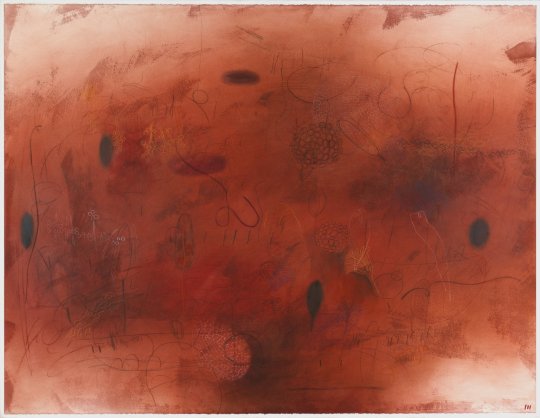
I am the Earth (Watashi wa chikyu) [Excerpt] by Kiyoko Nagase, Translated by Takako Lento
I am warm, moist soil I am a single supple stalk I draw my life all the way up into corollas of wild berries on the roadside
I am amazed at a breast of water welling to flow into the inlet of a muddy rice paddy I am amazed at myself being hot steam blowing fire and sulfur up from the bottom of the great ocean, deep indigo. I am amazed at the crimson blood flow covering the earth’s surface in human shape; I am amazed that it swells as the tides ebb and flow, and gushes out monthly under distant invisible gravity … I am the earth. I live there, and I am the very same earth.
In the four billionth year I have come to know the eternal cold moon, my other self, my hetero being, then, for the first time, I am amazed that I am warm mud.
The vivid imagery conjured up by Kiyoko Nagase’s poem is beautifully visualized by Emmi Whitehorse’s painting. The emphasis on deep Earth tones and abstract corporeality in both the poem and the painting really creates an intense metaphysical link between the environment and the self.
— Amanda Raquel Dorval, Archives Intern Emmi Whitehorse (Navajo, born 1957). Fire Weed, 1998. Chalk, graphite, pastel and oil on paper mounted on canvas. Brooklyn Museum, Gift of Hinrich Peiper and Dorothee Peiper-Riegraf in honor of Emmi Whitehorse, 2006.49. © artist or artist's estate
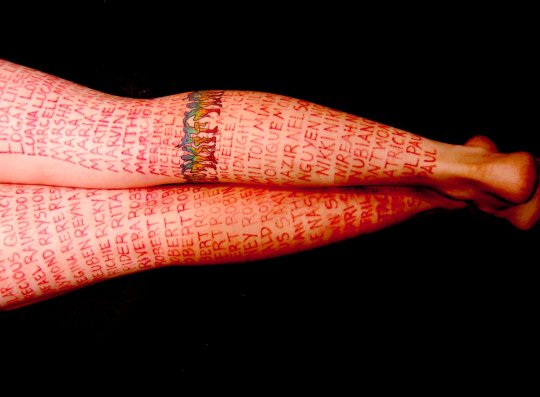
Seventh Circle of Earth by Ocean Vuong
On April 27, 2011, a gay couple, Michael Humphrey and Clayton Capshaw, was murdered by immolation in their home in Dallas, Texas.
Dallas Voice
1
2
3
4
5
6
7
________________________________________________________
As if my finger, / tracing your collarbone / behind closed doors, / was enough / to erase myself. To forget / we built this house knowing / it won’t last. How / does anyone stop / regret / without cutting / off his hands? / Another torch
streams through / the kitchen window, / another errant dove. / It’s funny. I always knew / I’d be warmest beside / my man. / But don’t laugh. Understand me / when I say I burn best / when crowned / with your scent: that earth-sweat / & Old Spice I seek out each night / the days
refuse me. / Our faces blackening / in the photographs along the wall. / Don’t laugh. Just tell me the story / again, / of the sparrows who flew from falling Rome, / their blazed wings. / How ruin nested inside each thimbled throat / & made it sing
until the notes threaded to this / smoke rising / from your nostrils. Speak— / until your voice is nothing / but the crackle / of charred
bones. But don’t laugh / when these walls collapse / & only sparks / not sparrows / fly out. / When they come / to sift through these cinders—& pluck my tongue, / this fisted rose, / charcoaled & choked / from your gone
mouth. / Each black petal / blasted / with what’s left / of our laughter. / Laughter ashed / to air / to honey to baby / darling, / look. Look how happy we are / to be no one / & still
American.
Ocean Vuong’s “Seventh Circle of Earth” has persisted as one of the great, affective moments of poetry in my life since I first heard Pádraig Ó Toama’s gorgeous reading and discussion of it on his podcast, Poetry Unbound. I decided to pair Vuong’s poem with Mary Coble’s Untitled 2 (from Note To Self) because both works are urgently immersive into the violence and experience of LGBTQ people in the U.S., and for how each work uses text and physicality to address presence, pain, and erasure. Vuong’s poem is actually footnoted to a quote from a news article about a gay couple murdered in Texas. The page is thus blank, absent of text. The reader has to sink below the main stage, the accepted space of word and story, to find the voices of this couple and the depth of their story’s tenderness, eroticism, and utter devastation. Coble’s piece foils the structure and effect of Seventh Circle of Earth by taking what was subverted by Vuong—text and the narrative of violence—wholly to the surface. Her photograph captures her own legs tattooed without ink with the names of LGBTQ individuals victimized by hate crimes. I cannot help but think of Franz Kafka’s short story “In the Penal Colony,” in which prisoners’ “sentences'' are inscribed by the needle of a “punishment apparatus” directly onto their bodies. I was struck by how the curator’s note for this photograph describes Coble’s artistic endeavor here as “harrowing.” The needle in Kafka’s short story is indeed called “The Harrow”. The noun harrow is an agricultural tool that combs plowed soil to break up clumps of earth and uproot weeds and clear imperfections. The verb to harrow means to plague, and in the story’s original German the verb for “harrow”, eggen, is also translated as “to torment”. Kafka and Coble conflate these definitions of “the harrow” in their respective works: they use a needled device, like the true noun definition, as an instrument of torment because of someone else’s idea of punishment and justice. Here, violence is brought to the surface, intimate in as much as we are brought right up to the artist’s skin and into the presence of her and her community’s pain. Together, one can see how each creator physicalizes their respective artistic space to tell the stories of LGBTQ people, of what is tender and harrowing, below the surface and written into the skin.
— Talia Abrahams, Provenance Intern, IHCPP Mary Coble (American, born 1978). Untitled 2 (from Note to Self), 2005. Inkjet print. Brooklyn Museum, Gift of the artist, 2008.10. © artist or artist's estate
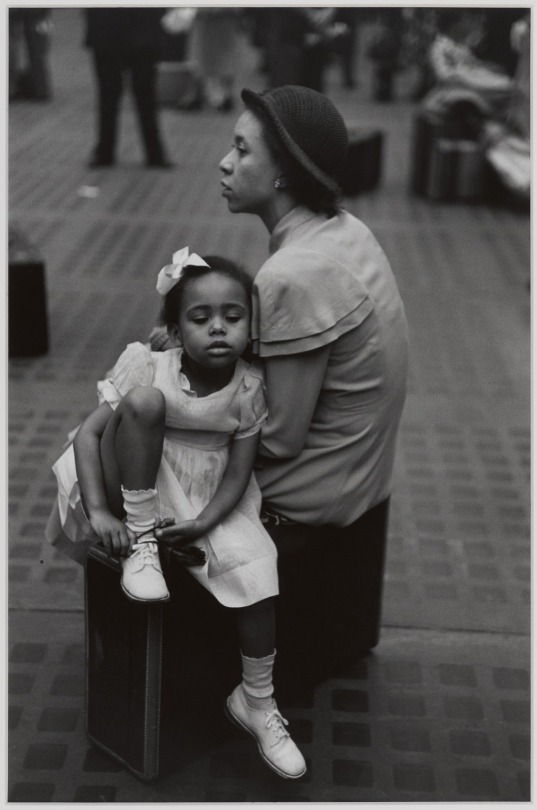
To my daughter Kakuya by Assata Shakur
I have shabby dreams for you of some vague freedom I have never known. Baby I don't want you hungry or thirsty or out in the cold. and I don't want the frost to kill your fruit before it ripens. I can see a sunny place Life exploding green. I can see your bright, bronze skin at ease with all the flowers and the centipedes. I can hear laughter, not grown from ridicule And words not prompted by ego or greed or jealousy. I see a world where hatred has been replaced by love. and ME replaced by WE And I can see a world replaced where you, building and exploring, strong and fulfilled, will understand. And go beyond my little shabby dreams.
This poem is featured in Assata Shakur’s memoir, Assata: An Autobiography. It details her hope for a better world that her daughter can grow up in. This poem is positioned in the book when Shakur is facing increasing prosecution as a result of her activism and affiliations with the Black Panther Party and Black Liberation army. Being written more than 30 years after this picture was taken, the poem summons me to think about the trauma that many Black women face and how much of that trauma gets passed down to their children. The black and white photo of a mother and daughter provides a nice visual to the poem. “The image of a Black mother and child sitting on their luggage reflects the little-discussed history of segregated transportation in the northern United States. Through the 1940s, Penn Station officials assigned Black travelers seats in Jim Crow cars on southbound trains” (Brooklyn Museum). The photograph of train passengers waiting outside of Manhattan’s Pennsylvania Station especially echoes the verse “I don’t want you hungry or thirsty or out in the cold.” The overall optimistic tone of Shakur’s poem alters our relationship to the image as we imagine the mother pictured above hoping for the exact same things
— Zaria W, Teen Programs intern Ruth Orkin (American, 1921-1985). Mother and Daughter at Penn Station, NYC, 1948. Gelatin silver photograph, sheet: 13 15/16 × 11 in. (35.4 × 27.9 cm). Brooklyn Museum, Gift of Mary Engel, 2011.22.3. © artist or artist's estate
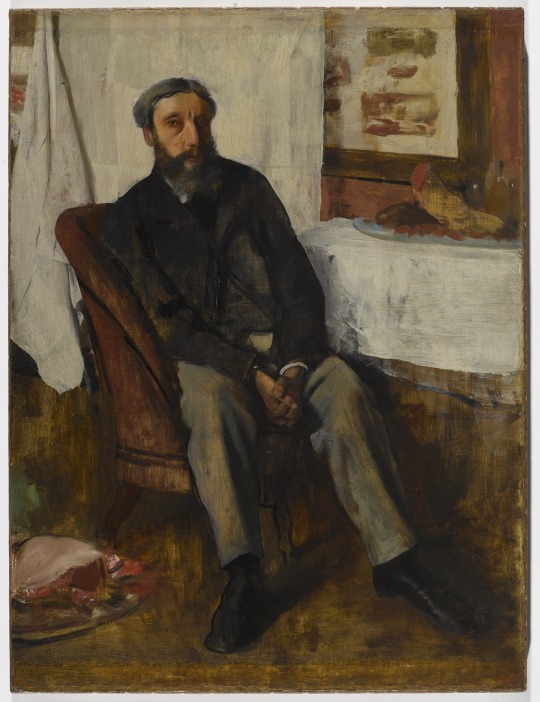
Crunch. By Kailyn Gibson
I retch as a mass of sinew lies between my lips. The sensation is unbearable. Fortunately, the jar of flies has gone missing again.
Slowly, surely, and yet never sure at all, the quiet of buzzing rings through the in-between.
It is a symphony wrought from blood and bone.
Saliva drips from bleeding, hungry gums, And the crunch of glass echoes the grinding of molars.
If I proffered a sanguine smile, would masticated shards look like teeth? Would they gleam just as prettily?
The flies ring, and the rot calls.
— Kailyn Gibson Edgar Degas (French, 1834-1917). Portrait of a Man (Portrait d'homme), ca. 1866. Oil on canvas. Brooklyn Museum, Museum Collection Fund, 21.112
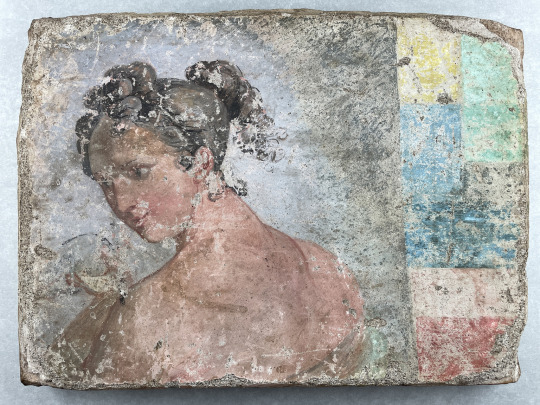
Excerpt from Autobiography of Red A novel in verse by Anne Carson
7. If Helen’s reasons arose out of some remark Stesichoros made either it was a strong remark about Helen’s sexual misconduct (not to say its unsavory aftermath the Fall of Troy) or it was not.
8. If it was a strong remark about Helen’s sexual misconduct (not to say its unsavory aftermath the Fall of Troy) either this remark was a lie or it was not.
9. If it was not a lie either we are now in reverse and by continuing to reason in this way we are likely to arrive back at the beginning of the question of the blinding of Stesichoros or we are not.
10. If we are now in reverse and by continuing to reason in this way are likely to arrive back at the beginning of the question of the blinding of Stesichoros either we will go along without incident or we will meet Stesichoros on our way back.
11. If we meet Stesichoros on our way back either we will keep quiet or we will look him in the eye and ask him what he thinks of Helen.
12. If we look Stesichoros in the eye and ask him what he thinks of Helen either he will tell the truth or he will lie.
13. If Stesichoros lies either we will know at once that he is lying or we will be fooled because now that we are in reverse the whole landscape looks inside out.
This excerpt comes from Appendix C of Anne Carson’s Autobiography of Red, a novel in verse. A translator and classicist herself, Carson mixes fact with fiction in her unconventional retelling of the myth of Geryon and Hercules, beginning with a roundabout introduction to the poet Stesichoros. Autobiography presents a captivating example of recent Queer projects that take up Classical material as their basis. A fascination with the Classical past has pervaded our modern conception of sexual identity politics, down to the very etymology of the word “lesbian.” In this fascination, I see the same desire to capture Classical imagery as cultural heritage which has also pervaded American museums, albeit with significantly different aims. The fresco pictured above comes to mind, which passed through many collectors and was even purchased by the museum before anyone pegged it as a modern piece—not an original Roman fresco. John D. Cooney, a 20th century curator of our Egyptian, Classical, and Ancient Near Eastern Art collection, wrote that “the unclad and somewhat winsome charms of the lady [probably] diverted objective glances.” Both in the case of the fresco and Carson’s novel, the “unclad and somewhat winsome charms” of the Classical past shape and reshape our understanding of history.
— Kira Houston, Curatorial Intern, Egyptian, Classical, and Ancient Near Eastern Art Modern, in the style of the Roman Period. Part of a Fresco, early 19th century C.E. Clay, paint. Brooklyn Museum, Ella C. Woodward Memorial Fund, 11.30.
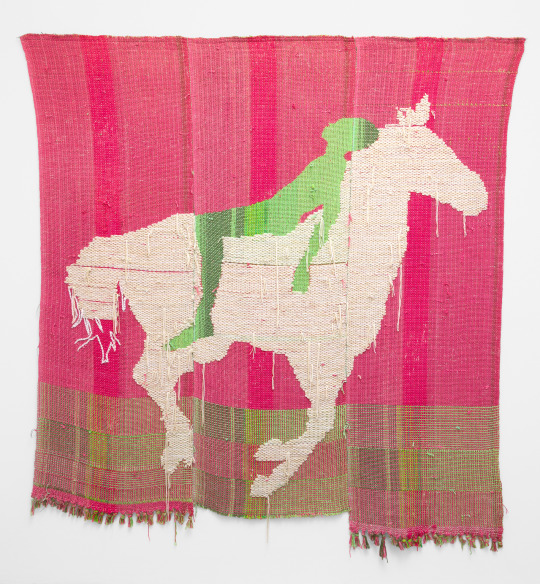
Late Fragment by Raymond Carver From A New Path to the Waterfall, Atlantic Monthly Press, 1989.
And did you get what you wanted from this life, even so? I did. And what did you want? To call myself beloved, to feel myself beloved on the earth.
— Shori Diedrick Brackens (American, born 1989). when no softness came, 2019. Cotton and acrylic yarn. Brooklyn Museum, Purchased with funds given by The LIFEWTR Fund at Frieze New York 2019, 2019.12. © artist or artist's estate
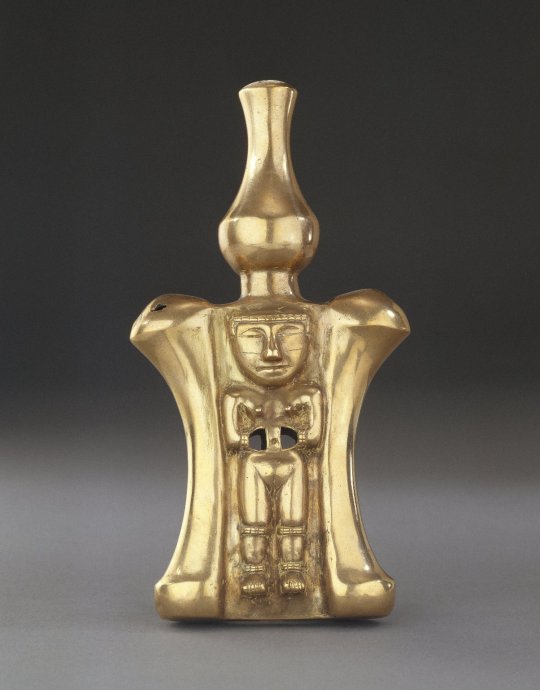
Jaguar By Francisco X. Alarcón
some say dicen que ahora I'm now almost estoy casi extinto extinct in this park por este parque but the people pero la gente who say this que dice esto don't know no sabe that by smelling que al oler the orchids las orquídeas in the trees en los árboles they're sensing están percibiendo the fragrance la fragancia of my chops de mis fauces that by hearing que al oír the rumblingc el retumbo of the waterfalls de los saltos
they're listening están escuchando to my ancestors' el gran rugido great roar de mis ancestros
that by observing que al observar the constellations las constelanciones of the night sky del firmamento
they're gazing están mirando at the star spots las motas de estrellas on my fur marcadas en mi piel that I am and que yo soy always will be y siempre seré the wild el indomable
untamed espíritu silvestre living spirit vivo de esta of this jungle jungla
While the author of the poem speaks about animals, their words can also speak on behalf of the erasure of indigenous peoples in South America. Much like the jaguar, indigenous traditions and culture are very important to life in South America. Despite their marginalization, Indigenous peoples throughout the Andes used coca leaves to help with the altitude. The use and cultivation of coca are criminalized throughout most of South America despite it being essential to indigenous cultures. This vessel was used to contain lime which would activate the coca leaves. Much like the jaguar, indigenous traditions are also faced with endangerment despite being woven into the fabric that is Latin America. Through the opposite man and woman figures, the vessel shows the duality that is important to the Quimbaya people which is still relevant to Colombians today.
Aunque el autor del poema habla sobre los animales, sus palabras también comunican el sentimiento común de la supresión de los indígenas en Suramérica. Con la mención del jaguar, se puede entender en el poema que la cultura y las tradiciones de las personas que son indígenas son sumamente importantes para la vida en Sudamérica. A pesar de su marginación, los indígenas en Los Andes utilizan la hoja de coca para ayudar en la altura de las montañas. El uso y el cultivo de la hoja de coca fue criminalizado (penalizado) a través de Sudamérica, aunque su uso para los indígenas era vital y esencial para su cultura. Este recipiente que se utiliza contiene limón lo que activa la hoja de la coca. Similarmente al jaguar, las tradiciones de los indígenas siempre estaban en peligro aunque estuvieran entrelazadas en las telas de lo que sería Latinoamérica. A través del hombre opuesto y las figuras de mujeres, el recipiente muestra la dualidad de lo que es importante para las personas que son Quimbaya, algo que todavía hoy es relevante para los Colombianos.
— Jeffrey Alexander Lopez, Curatorial Intern, American Art & Arts of the Americas Quimbaya. Poporo (Lime Container), 1-600 C.E. Tumbaga. Brooklyn Museum, Alfred W. Jenkins Fund, 35.507. Creative Commons-BY
116 notes
·
View notes
Text

They met when the cicadas sang and every cooling breeze was a gift.
The air was hot and hazy along the swaying tree line spanning across a crooked horizon of mountains beyond. If not for the brilliant beacon of her soul, perhaps they would not have seen her amongst the blurring waves of summer heat blanketing her fallen form on the ground. She was a filthy thing, diminished by the lingering dark, the leeches of creatures which dwelled, too, within this grand forest. A victim of their hunger for a mortal’s essence, this poor human. A little girl all alone.
When the kami neared, they stopped at the treeline with piercing eyes ablaze. A faint after-image of three men, adults, filthy humans, came to memory that didn't belong to them. Hers, rather.
These men huddled around her, poking and prodding, such despicable things... as though she were an ant to be squished, prey to be toyed with by the end of a stick. The acts of man could disgust at times, how eerily soulless one could be of their own free will. The influences of demons could excuse very little when regarding a tainted heart. Scorched footmarks indicated such influences had been present, the taste of ash in the air burned at their nostrils. It was a miracle this child still had her soul at all.
The kami would not appear to her in the same height, the same manner, as the assailants that left her broken and crying. Nor was she young enough, an infant or toddler perhaps, for them to reveal their true form without causing her distress, confusion, and frustration while living out the rest of her mortal life knowing celestial beings walked amongst humans. Perhaps she was already jaded, left incapable of witnessing their genuine form in its entirety, all innocence drained from her. If that was the case, they could have walked forth regardless of appearance, and her mind would fill the gaps and the incomprehensible with something bland and utterly human, normal, capable of being processed with ease.
No, she still had a thrumming slice of light in her. Best to be reasonable and not test her faith. Instead, they shifted into another smaller form with complete fluidity, elegant robes and tails twisting into the winds and morphing, vanishing, shrinking, dissipating akin to snowfall in the summer air. In the gust of wind that breathed out around him, he stepped outward anew; a child, too. Non-threatening, he even went a year or two younger than her for the sake of her utmost comfort. Friend. I am your friend.
He stepped forward, put on a smile, and padded down from the confines of the lush trees and brush which cloaked him from sight. The rustling footsteps, bared feet on soft ground, seemed to indicate his approach well enough to rend the girl alert, scrambling to sit up and wipe at her eyes as though being caught in the act of emotion was something of an embarrassment.
In fact, she got quite defensive over the matter. Puffed her cheeks and everything. Until compassion washed over her, and concern.
Huh.
“What’s up with those marks? Are you bleeding?” Puffy eyes widened at him, and she rubbed at them again with the back of her hand as though to clarify what she was seeing.
Quieter, as though sharing a secret, she spoke again. "Did they get you too?"
Blinking, he raised a hand to observe, as though unaccustomed to its lightness, its flesh and bone, its power restrained; he felt tiny, contained into this little vessel to appease her. Idly, he found the issue upon the backs of both his hands. Red, smooth, these markings flowed up his wrists and arms beneath the robes he donned, then peeked out at the nape of his neck. As though the canvas for brushwork, brilliant in color, it stained his skin. He could only surmise that a blatant and decently sized crimson circle resided directly at the center of his forehead. Similarly colored lines beneath his eyes, as well as matching painted strokes of red trailing both legs, feet, buffered at the ends by circles just above his toes.
These were the blood-red designations of a kami, often following him through his other transformations unless he chose to deliberately obscure them. Seemed like he forgot, for a moment, to hide them from her.
“Oops!” He proceeded to dust himself off as though he recently tumbled through the same dirt she sat on. Each swift and hurried pat, swish, and brushing gesture seemed to quickly vanish those markings from his skin, magic. Like wiping away at a blemish, regardless of the fact that his divine marks were anything but a blemish, and he became less so inhuman.
He finished the adjustment, straightened up his simplistic yukata, then smiled wide and with triumph. A little shrugged gesture, hands displayed, to show her he was done.
“Better?” A flop of his hands at his sides, what skin that showed from dark yukata was now as pristine as the rest of him, as though his feet had not touched the ground beneath, as though he did not belong in the same breath as the dirtied rags on her shoulders. In any dimmer lighting, were the days not shining with warming rays of the sun, perhaps a faint cool glow would accompany his form. Numerous efforts were required in order to properly project humanity to her, his restraint being the key. He was attempting to dial things down.
Normally, he would not have even tried to fit in; appearing in a roar of blinding light and tranquility. Or send a messenger in his stead, copper fur and a mischievous grin. Perhaps he was a tad bit rusty, playing human.
She blinked at him slowly, recovering from a dazed state. Discreetly, invisibly, he nudged her away from the thoughts that lurked around his strange markings, at the way they dissipated before her very eyes. She blinked thrice more, then seemed to accept his soft tampering of her memory... unbeknownst to her. Not something he did too often, an unfair trick. He disliked influencing humans in such a manner.
“Y—… yeah... but why’s your hair silver ?”
...Ah, he forgot about that. Rustier than he initially thought, then.
Should he tamper with her again, or knock her out and wipe her memory… and start all over? That felt excessive. But...
“Oh, uh—”
Before he could even fathom how to casually adjust his hair color before her very eyes without causing alarm, or whether or not he should simply stun her into a daze to undo his missteps altogether… he felt the girl moving away from the topic on her own accord, thoughts trailing elsewhere, like where he came from, or if it was safe for her to stay here — if the demon-influenced men would return with their scary eyes.
So he left it as it was, his hair apparently silver. Absently, he decided from here on out to do a once-over by the reflection of a nearby water source… to avoid any further slip-ups.
She seemed unafraid, otherwise, especially in meeting his vibrant gaze with her icy blue eyes in kind. Others would avert, look away, unable to lock onto his eyes without a feeling of being pierced, of their soul being seen in its entirety, a hushed multitude of whispers caressing their temples, their minds, as his presence quietly overwhelmed them.
No, she was staying resolute. She could look into his eyes without divinity swallowing her whole. A brave girl full of heart, she did not fear. At least for now.
“What’s your name, anyway?” She was quick, cutting, a no-bullshit approach to the one who interrupted her moment of vulnerability and sadness. Her nose scrunched, and that telltale sign of wariness began to show.
Ukanomitama-no-Mikoto seemed like a mouthful, though it was first to come to mind; a lesser-known alternative to the given name humans doted upon for him. And there were too many others, far too many, and far too on the nose. Who was he, again? In days of old, they’d split into three. Or five. Into various shapes, sizes, and genders too. Today, he picked a boy, as lithe as she was. A non-threat, limbs thin akin to stalks of bamboo.
“I dunno, I’m a lil mixed up right now.” An understatement, apparently.
“That’s stupid, you don’t even know your name? I know my name, it’s Matsumoto Rangiku . Yours… hm, it’s Gin , ‘cause of your weird hair.” A head tilt was all her harsh tongue earned, a wholly unbothered air. In fact, he bloomed pleasantly at her decision to name him. Accustomed. Accepting. Appreciative. How often humans took in his kin, his shrines, naming torii and foxes alike, giving title here and title there, naming foods and offerings… and naming him, over and over. Naming, naming...
Gin, then. He was Gin.
Her thoughts, her scrutiny, veered closer to feeling some semblance of humor about him; how silly, this boy who hadn't even noticed he had those weird red stains on his skin, didn't even know his own name. Silver hair, too. How silly. She thought of him like a wild animal trotting over to her from the brush, as though feral and unaccustomed to seeing another person, unafraid due to ignorance and confidence combined. Curiosity, yes, she titled his motivation quite well.
Sharp, this girl.
Through her eyes, her assessment of him seemed fair, and Gin smiled wide in acceptance. The verdict this girl reached was of dismissal, distracted by the sharp reminder of hunger growling at her stomach.
“Hungry?” He asked, as though unaware, a boy simply answering the cue of that telltale sign. He knew she felt weakened and hadn’t eaten after she ran from her keepers. Several days, now. Midday, she was coming up on the fourth before he intervened, darkness clutching at her to drag her further off into the woodlands and mountains beyond.
A wandering soul awaiting oblivion, and the leering creatures thought her theirs.
No, not quite yet.
Gin knelt down to be at her height, crisscrossing his legs beneath him to settle in, and reached behind his back as though to unfasten a bag of a traveler. Nothing was there, really, nothing at the moment. Yet his patient palm subtly glowed with purpose and want, materializing within it a fruit readied to be eaten. He reckoned she’d want something sweet, and by his divine right it felt appropriate to give her one meant for longevity, delivered directly from the plentiful harvests he presided over.
“Here, I got this for ya,” Gin offered out the persimmon from behind his back, and watched as she squinted to peer around him, seeking out the tell of his little trick. Ever the skeptic, she sought out answers she could not immediately identify, this nameless boy that had blood-red marks on him, who did magic tricks with fruit.
Scoffing out a blow of air, she relented, then took it.
“Did you hide this up your sleeve? You’re so weird,” she whined out, though appeased herself swiftly with a big bite of his offering. Already, the diminishing glow of her soul was mending itself, illuminated by the unseen fury of celestial light embodying him. They sat together as she ate.
“Maybe, I like pullin’ tricks like that.” He reached back again, mirroring his earlier actions, and returned his palm out before him carrying another persimmon within it. He plopped the fruit into her lap and swayed back and forth playfully. “See? Pretty cool, huh? Wait, I think there’s one more …”
Reaching back, Gin brought forth a rock instead and acted visibly confused.
“Eh? How’d that get in there?” He dropped the rock, then made a show of searching his sleeves. She barked out a laugh, cheeks full of fruit and a smile full of light.
Gin beamed.
#[ drabble ] his silver tongue weaves words; but he doesn’t lie#[ verse: inari ] he would name himself trickster; demon; before claiming divinity#owo#long post /
12 notes
·
View notes
Note
And could I also have suna and “I hope you know that I needed ya here” from Rose by Briston Maroney
Pls and thank you! xx
Youth is a fleeting thing. Try to hang on to the final gust of its fragrant summer breeze and you’ll find yourself clutching at nothing but dry autumn leaves dancing in a frigid wind, hands empty and chest hollow. But still, you’ll try. Oh, how you’ll try.
“How long?”
You blink, watching as Suna folds his gum wrapper into a tiny silver square. “Twenty-one days.”
“That’s close,” he says, handing you the wrapper. Out of habit, you fold its corners inward, beginning to shape it into a heart. “Too close.”
“I know,” you say, swinging your legs off the edge of his truck bed. It’s twilight, and the cicadas have begun to sing their melancholy melodies. “Let’s make the most of it.”
He laughs drily. “The most of it?”
“Yeah,” you say firmly, scooting closer. “I won’t be a bona fide college student for another three weeks, so let’s be dumb high schoolers for just a little longer.”
“I might always be a dumb high schooler at heart,” Suna says, looping a loose arm over your shoulder. He plucks the gum wrapper heart from your fingers and tucks it into his pocket, adding it to his collection.
“Nah. You’ll grow up someday.” You fiddle with the hem of his flannel absentmindedly, running the pad of your index finger up and down its seams.
Suna sighs almost inaudibly, leaning on your shoulder. This sort of closeness has never been unusual for the two of you, but tonight is a little different. It’s a little impulsive, a little desperate. “I don’t think so.”
“What?”
“I don’t think I want to grow up,” he says, turning his head to look you square in the eyes. “Not without you.”
“Rin,” you say, but he’s shaking his head.
“I need you here,” he says, and you can tell he truly believes it.
“You don’t,” you insist, and for a second, you think you see him sniff. “You’ll be fine without me. Really.”
“If you think that,” he says, tilting his head, “you must not know me very well.”
There’s a beat of silence, a silence filled with unspoken longing and tension thick enough to spread on bread. For a moment, you teeter on the tightrope between best friends and soulmates, only to find that there’s not much difference between the two. When he kisses you, it’s like a puzzle clicking together; his hands fit your waist and your lips fit his like fate designed them just so.
You’re starry eyed and hot headed when you break apart, and one look his face tells you he’s exactly the same. Hesitantly, you place your palm over his. “I can’t stay, Rin.”
He smiles sadly and pulls you into an embrace, tucking your face in the crook of his neck. “I know. I wish you could, though.”
“Right person, wrong time?”
He shakes his head. “Right person, right time. I’ll wait for you.”
You smile away the tears threatening to spill over your lash line. “Okay. I’ll wait for you, too.”
Youth is a fleeting thing. It doesn’t last, no matter how much you wish it would. But sometimes, if you’re lucky enough, youthful love trips, twirls, and stumbles its way into true love... and you and Suna Rintarou are pretty damn lucky.
23 notes
·
View notes
Text
read on ao3
Neon light washes against the pavement, small puddles hinting at the afternoon showers that earlier overlooked the city. Inside, soft music pours from the speakers, adding a pleasant touch to the buzzing atmosphere already filled with chatter and laughter. People come and go, black coats and scarves hung over their chairs, swirling their drinks in their hands and taking bites out of their food. Servers take orders —Friday nights are chaotic— and try to keep up with the customers swarming the bar, eager to get a table and escape the crisp autumn air.
Raindrops fall from the trees that stand tall on the sidewalk, sometimes catching on Eskel’s hair, making some strands stick to his forehead. His glass is cool against his fingers, the remnants of the amber lager he’d ordered resting at the bottom. His knees are bumping against the table, his back hunched from sitting on the weirdly-shaped bar stool — who designs these things, anyway?
“You want some of my fries?”
He pushes the small plate in Geralt’s direction. His cheeks are bright red, both from the cold and the beer he’d been nursing, white hair up in a messy bun. The soft orange light from the vintage lightbulbs on a railing over their heads paints his profile bronze gold, his eyes glimmering in the shadows of the night.
Geralt had insisted on them sitting outside, something along the lines of it’s too warm inside and can’t talk with all that noise going on. Eskel had shrugged, though a small smile crossed his face when Geralt balled up his jacket and affectionately tossed it to him, like he’d done a million times before.
Reaching across the table, Geralt grabs a small packet of ketchup and rips it with his teeth. Eskel takes a sip of his beer, unhurried.
“Remember what you’d say when we were kids?” Geralt says after a while, his voice low. “Those nights when we’d lay on the back of your truck, looking for satellites?”
Eskel huffs a laugh. He knows. Entire nights spent out on the fields drinking beer (stolen from Vesemir’s fridge), noses curling up in disgust at the bitter taste — beer was an acquired taste, or so they promised themselves. Eskel driving out to the outskirts of town just for the sake of it with Geralt in the passenger seat, his hand drawing circles in the air out the window. How they’d sit on the grass, side by side, the summer stars shining bright above them, the sound of cicadas and frogs filling the comfortable silence.
“I do,” he says, his fingers drawing circles on the table, stringing the droplets together like a pattern.
“You’d tell me,” Geralt leans forward, his elbows resting on the tabletop, “that if I ever wanted to run away, you’d come with me.”
“Do you feel like running away?”
A car passes them by, headlights flashing against Geralt’s pale skin, and for a second, Eskel can see him, buzzcut and split lips curled into a wicked grin, jumping in the river at night. His calloused hands, freckles peppering his golden skin after spending weeks working on the fields under the burning sun, tired eyes crinkling at the corners.
And the look Geralt’s giving him right now is one he recognizes well. He’s seen it before — the night Eskel left for college, the day after his mother was buried, the summer the storm broke loose and the winds tore the barn apart. It’s exhaustion set deep in his bones, dark circles framing his amber eyes, revealing nights of restless sleep.
Geralt shifts in his seat, idly smearing the ketchup across the plate with the tip of his finger.
“I don’t know,” he says quietly. “Sometimes I just want to let go. Or maybe I’m just getting old.”
“You are, though,” Eskel teases, but it feels too ominous. “Where would we run away to? Hypothetically.”
Geralt huffs a laugh around a mouthful of beer, still smiling when he swallows it down.
“Hmm,” he says, looking thoughtful. “Not the city.”
“Never the city,” Eskel agrees.
“Maybe a town.”
“Yeah… a shitty town in the middle of nowhere. Somewhere it’s not too hot.”
Geralt narrows his eyes, considering, a smirk on his lips.
“How shitty a town are we speaking of?” he says, raising an eyebrow. “You know me.”
And he does. He knows Geralt early in the morning, knows him in the dead of the night. He’s seen him, inside and out, the good and the bad. Seen the sunlight draped over his naked back, his hair messy and long that year he’d refused to cut it, his small act of rebellion. He’s heard him cry, tears welling up in his eyes for hours on end, his voice a choked sound. He’s felt Geralt’s warm skin under his hands on the nights beds were scarce and the winter was rough, felt his breath against his face, the beating of his heart under his own head.
Eskel shakes his head, biting his lip in fond exasperation.
“Very shitty. As in no-phone-signal shitty. Maybe a diner, a few houses down the road. We’d live in a cabin by the river.”
He sits back on his chair, his arms crossed on his chest.
“Yeah,” he continues, “there’d be a big town nearby. Not too close, though. Like an hour drive away. We’d go get groceries and beer once a week.”
Geralt smiles pleasantly, some of the weariness lifting from his face. A waitress swipes a table nearby, and Eskel asks her for a refill.
“This cabin by the river,” Geralt says suddenly, “how big is it?”
“Hmm... Not too big, so we don’t have to waste too much time keeping it clean, and so we don’t feel tempted to keep too many things.”
“Ever the minimalist,” Geralt teases. “How many bedrooms?”
Eskel takes a moment to consider. He thinks of the barn, countless times in which they’d fallen asleep together, laying on a pack of hay, limbs entwined. Rainy days spent in that worn yellow hammock Vesemir kept hanging from an old oak tree, card games that ended in lazy afternoon naps. Mornings in which he’d wake up slowly, his nose buried in silver hair, arm lazily thrown over Geralt’s waist.
“One,” he decides, and Geralt silently nods in agreement. “With a good mattress, though.”
“Yeah, old man, I know. Your back kills you.”
Eskel takes a sip from his lager, the bittersweet taste clinging to his tongue. He puts it down and zips his jacket all the way up. It smells like Geralt — the faint scent of sweat and smoke mixed with laundry soap.
“You’ve got…” Geralt clicks his tongue and leans forward, his thumb swiping foam off Eskel’s chin. It’s a simple gesture, yet such an intimate one that he can’t help but feel his face burn.
“Thanks,” he says, his voice small.
They sit in silence for a while, watching people move around them. It’s almost midnight and a group of young women speaking a foreign language walks past, the clicking of their heels fading away in the darkness. A man and a golden retriever stroll around the block, the dog barking at Geralt excitedly as they pass them by. He smiles.
“How many dogs?”
Eskel rolls his eyes.
“You can have as many as you like. I’m not cleaning up after them.”
Geralt pouts, a strand of white hair falling on his face, and he looks ridiculously endearing. “Fine,” he says. “But they’re sleeping in our bed.”
“Fine,” Eskel concedes, his mind caught up on how easy it rolls off his tongue. Our bed.
Drinking the remnants of his beer, Geralt gets up, muttering something about getting the check. Eskel doesn’t fight him, knows his efforts to pay him back are always in vain. When he comes back to their table, Eskel’s already standing with his hands on his pockets, his head tilted back, looking up at the dark sky.
“I mean it, you know,” he says quietly when Geralt joins him on the sidewalk, still looking up.
Geralt turns to look at him, a tiny frown knitting his eyebrows. “What?”
Eskel exhales softly, watching the small white cloud of his breath disappear into the air. He meets Geralt’s eyes, stepping closer.
“I’d run away with you. I always would.”
“Yeah?” Geralt says with a lopsided smile, the tip of his nose pink. “Even with ten dogs sleeping in our bed, and no cell-signal?”
They do it often — daydreaming about a quieter life. Sometimes it’s a secluded cabin in the woods to fulfill Eskel’s wish to live as deliberately as Thoreau would have wanted, sometimes it’s a house in the hills for Geralt to raise a flock of sheep. Away from the sounds of the city, the busy pace of living, the high demands and expectations. No matter what scenario they choose to indulge in, they’re always together. Never apart.
Eskel moves closer still, his breath intertwining with Geralt’s, the tip of their shoes touching. His dark hair falls on his eyes, and Geralt pushes it back with his fingertips, his touch lingering.
“In a heartbeat.”
Eyes closed, Eskel feels Geralt’s lips brush against his for a second, the touch barely there. He doesn’t push, simply rubs his nose against Geralt’s, meeting his amber gaze. He twirls a loose strand of white hair on his fingers, gently tugging before pulling back, Geralt’s lips curling into a soft smile.
“Let’s go,” he whispers.
Eskel nods. “Let’s go home.”
#mywriting#geralt/eskel#geskel#geskel fanfic#eskeralt#idk this pairing has too many names#modern au#geralt of rivia#eskel witcher
75 notes
·
View notes